Gorilla Zkittlez Auto Cannabis Strain Week-by-Week Guide
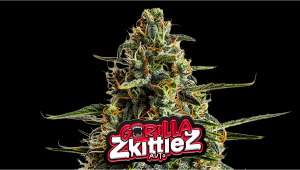
- 1. Grow specifications
- 2. Grow set up
- 3. Germination and seedling stage | week 1
- 4. Early veg | week 2
- 5. Mid veg | weeks 3-4
- 6. Transition (pre-flower) | week 5
- 7. Early flower | weeks 6-7
- 8. Mid flower (bulk phase) | weeks 8-9
- 9. Ripening and harvest | weeks 10+
- 10. The outcome
- 10. a. Gorilla zkittlez auto yield
- 10. b. Gorilla zkittlez auto smoke report
- 11. In conclusion
Gorilla Zkittlez Auto is the perfect strain for those who have previously fallen in love with Gorilla genetics and its terrific potency and resin production but want to see if this power could maybe go along with new and interesting flavors. In our Gorilla Zkittlez Auto week-by-week guide, we describe the art of growing one such new hybrid and show that it is in fact no downgrade from the original and maybe even an improvement.
1. Grow Specifications
With her 70% Indica / 30% Sativa composition, Gorilla Zkittlez Auto is a strong and vigorous hybrid that is short and sturdy, with tight internodes and big and dense colas. Her height stays within 100–150 cm (39–60 inches), but the side branches have the tendency to grow long, competing with the central cola which allows this auto to achieve spectacular yields of 550–650 gr/m2 (1.8–2.1 oz/ft2) indoors. Outdoors, the yield potential varies wildly depending on the climate conditions but is equally generous at 50–350 gr/plant (2–12 oz/plant).
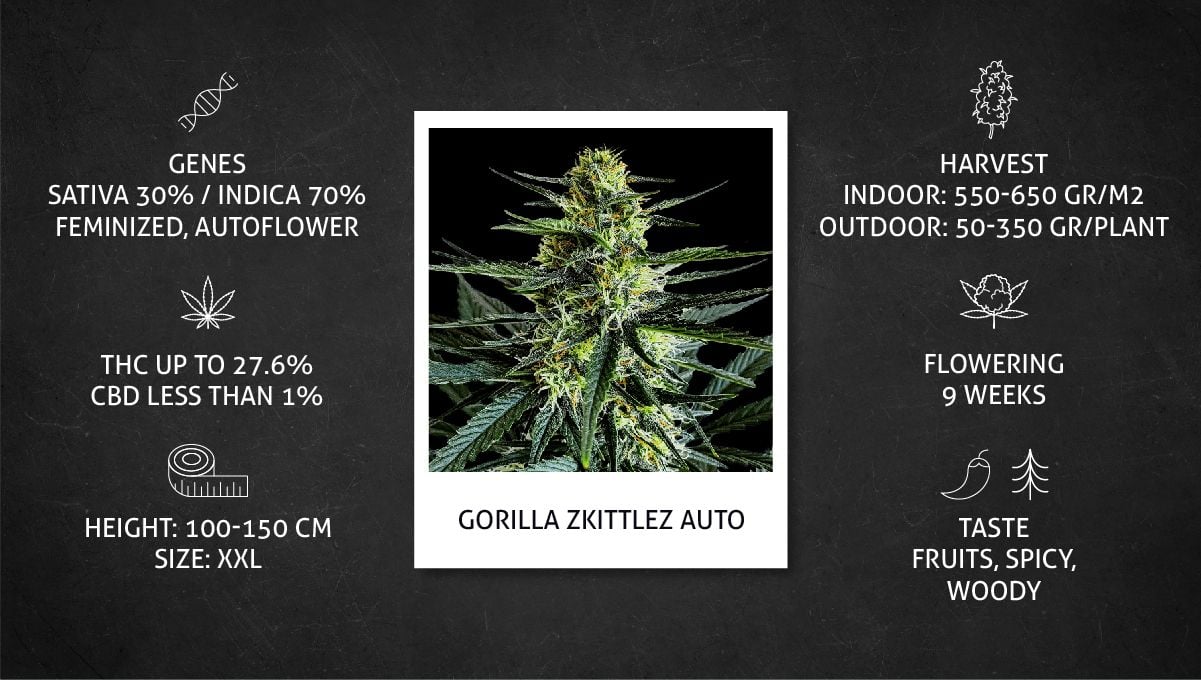
The trichome production is just as amazing as the buds and sugar leaves get completely obscured by trichomes that pack up to 27% THC and are bursting with terpenes. The buds give off a unique blend of old-school cannabis stench and fresh fruity aromas while the taste is like a citrus explosion on your palate.
2. Grow Set Up
Despite being a new, innovative hybrid, Gorilla Zkittlez Auto is prominent on Growdiaries with several dozens of finished reports. We chose four of them where the growers used coco as the growing medium as we thought they were the most instructive – coco is relatively easy to master even for a beginner grower, and it ensures spectacular results. It's certainly a medium that can (and did) unlock the potential of our Gorilla Zkittlez autoflower.
| Grow Space | Light | Medium | |
|---|---|---|---|
| A | 0.6 m2 | 245W LED | Coco/Perlite |
| B | 0.6 m2 | 680W LED | Peat/Coco |
| C | 0.36 m2 | 100W LED | Coco/Perlite |
| D | 1.49 m2 | 660W LED | Coco/Perlite |
Having said that, Gorilla Zkittlez Auto is an easy-to-grow and low-maintenance cultivar that performs just as well in any other grow medium and setup, and regardless of your growing conditions or cultivation techniques employed, you can count on a generous yield.
3. Germination And Seedling Stage | Week 1
To ensure your grow's success from day one, you need to perform the germination just right so that the seed doesn't waste the precious energy resources stored inside it on dealing with subpar conditions. It's no rocket science btw – there are dozens of good germination practices, and any of them will work fine.
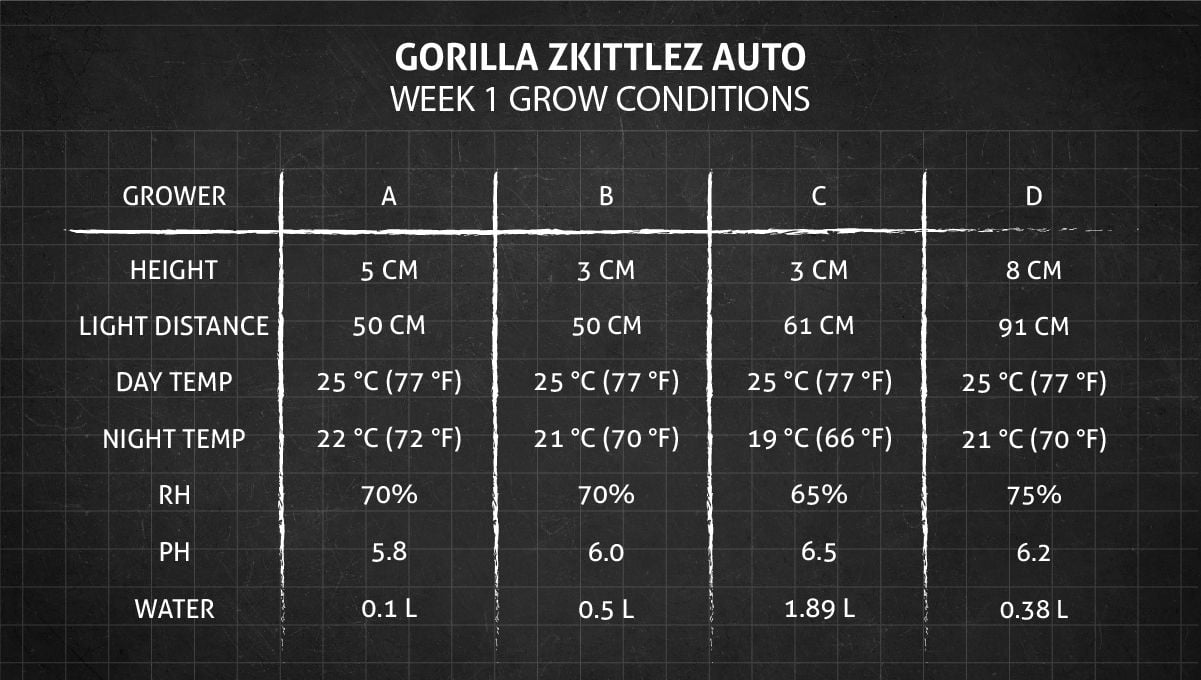
Some gardeners prefer to raise the chances of germination by pre-soaking the seeds in a glass of water for 12 hours or even keep them floating on the surface of water until they show tap root. The other easy way is to germinate your beans between wet paper towels and, as soon as the taproot is long enough (about half an inch, or 1 cm), to transfer it directly into a pot filled with a growing medium.
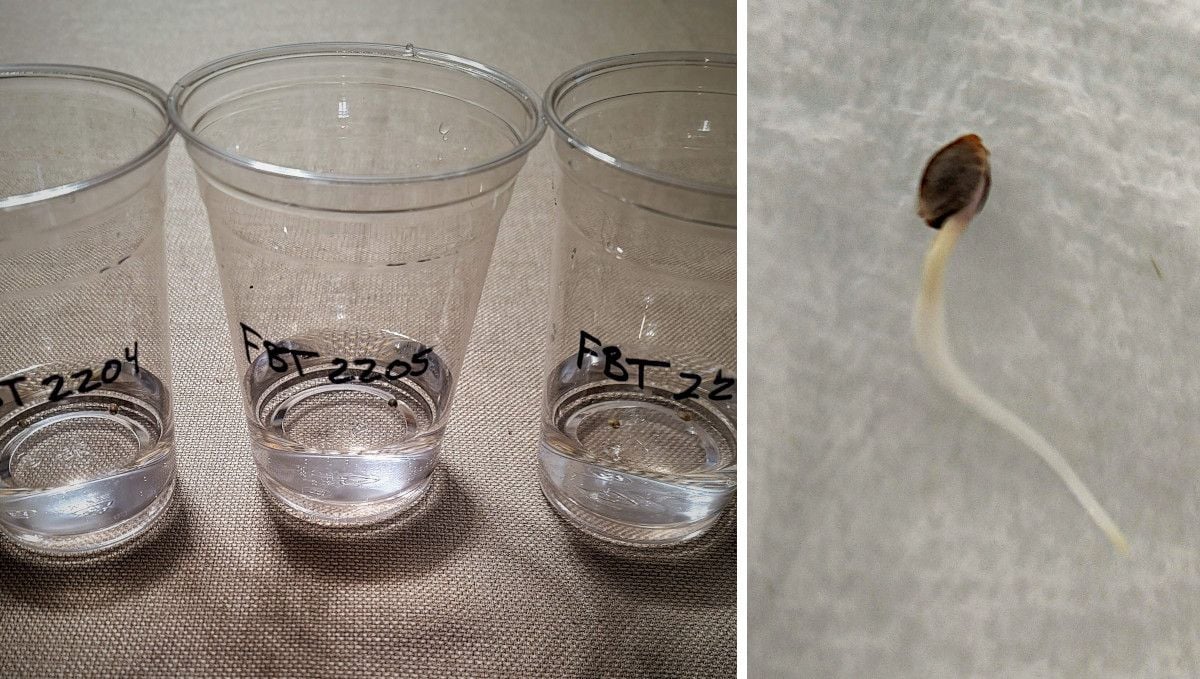
The next step is to insert the seed taproot-first into a small hole in soil, coco, etc. and cover with about a quarter of an inch of the loose and moist medium. The only thing that you should take care of after that, that is before your sprout appears, is to not let the medium dry out. The growing roots will definitely need some moisture, and it will also make the seed hull softer so the seedling will probably shed it on its own.
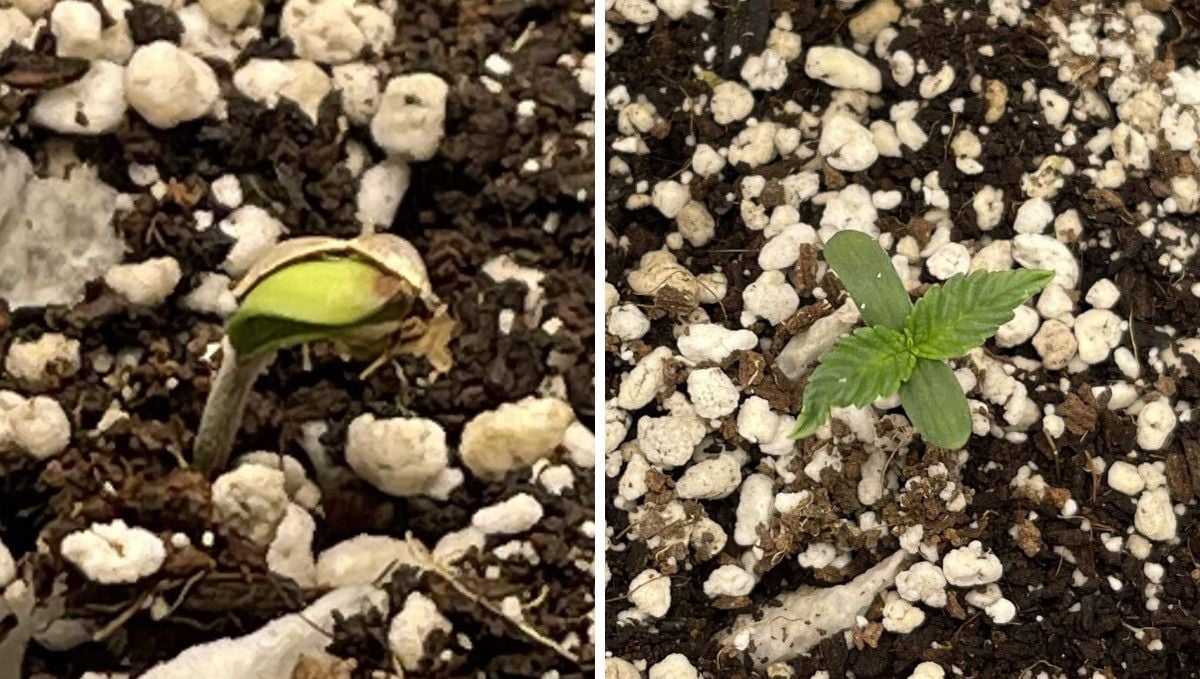
While Grower B used the peat-and-coco-based Top Crop Heavy Mix, the other three chose a coco/perlite mix which is the golden standard for cannabis cultivation. While coco is good at retaining water, perlite keeps enough oxygen in the medium for the roots not to suffocate. As for the ratio of these two ingredients, go for something like 70/30 and play around these values until you find a combination that works best for you and your girls.
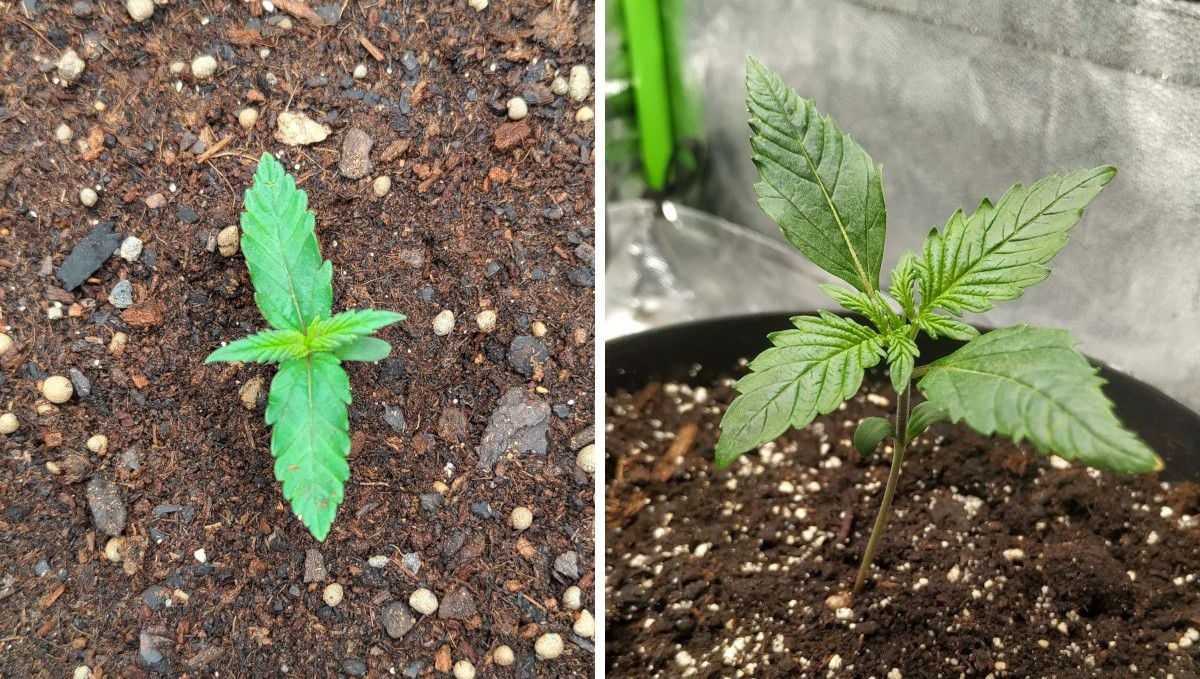
4. Early Veg | Week 2
The seedling stage is the most vulnerable in the life cycle of a cannabis plant, so if you want to help the little one grow and raise her chances of survival, make sure you keep the environmental conditions at optimal levels.
The most important one is the daytime temperature. If you can keep it at around 25°C (77°F) through all of the growing and flowering stages, it's great, although the young plants prefer temps a couple of degrees warmer than that. The correct relative humidity also contributes to the plant's health and growth rates. It should be somewhere between 35%-65% for the whole of the life cycle, and again young plants prefer higher RH. If you fail to raise it in the whole grow tent, use a humidity dome to make things humid at least locally.
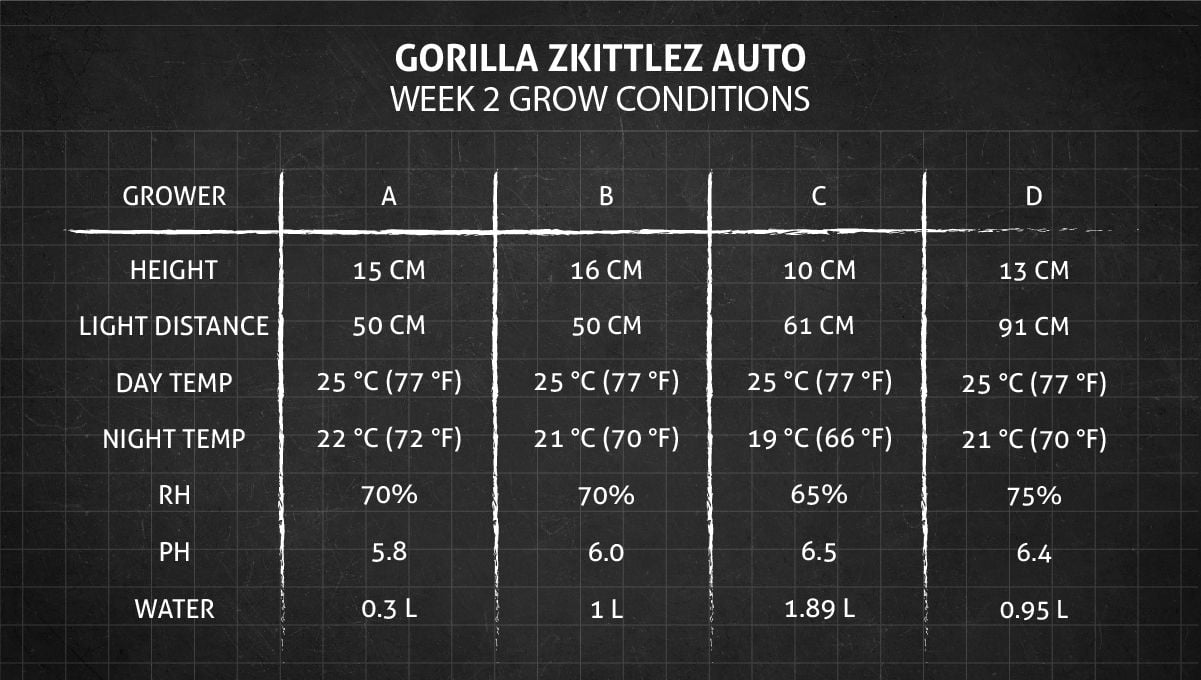
Another important thing is the right distance between the lights and the seedling. Make it too close and the plant will slow down its progress. Keep the lights too far and it will stretch to an unhealthy degree and look flimsy. Of course most growers manage to keep things between these two extremes (as you can see in the photos below).
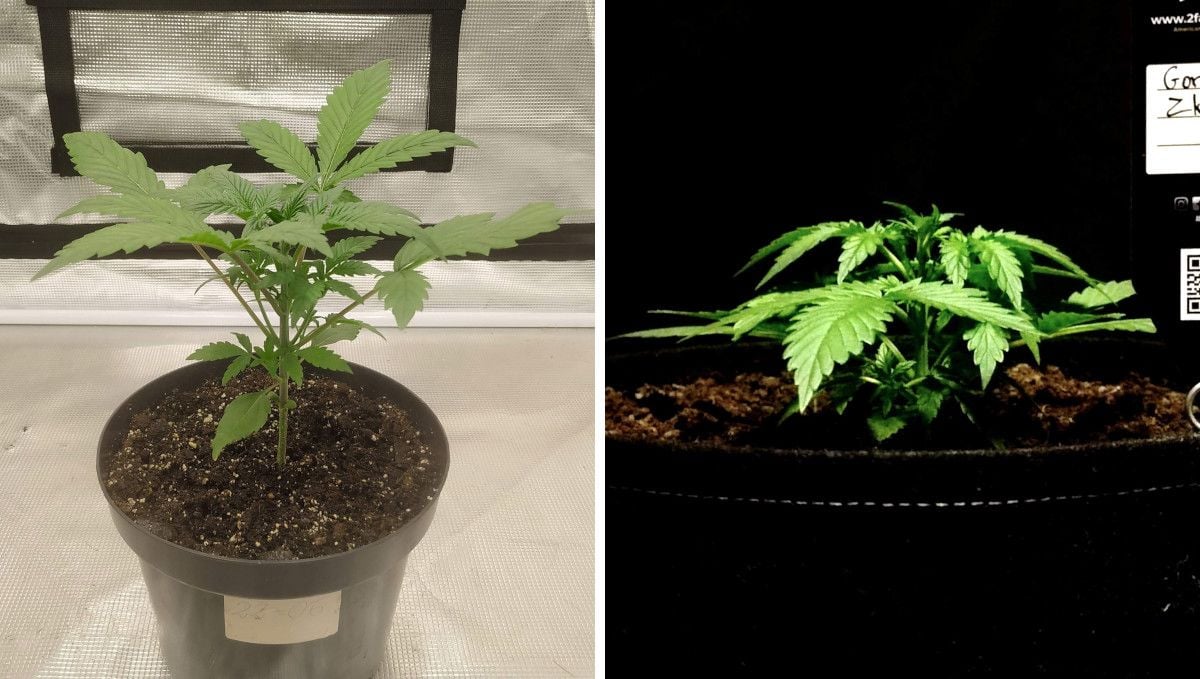
You can easily tell that your girl is doing fine if each new pair of leaves grows to be bigger than the previous one. Since all of the growers in our guide were using coco, they all began to add some nutrients to their water practically from day one. Otherwise, the seedlings would soon have run out of their inner resources – those that have been stored inside the seed.
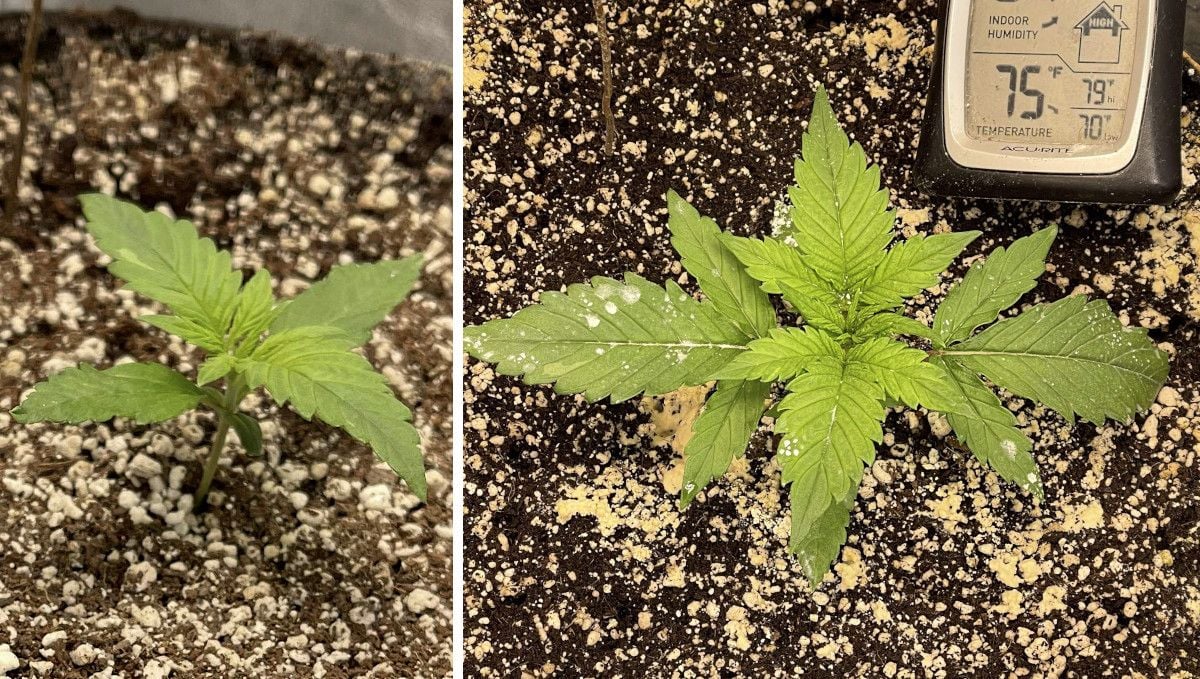
You can see from the photo above that Grower C even went one step further and also foliar-fed his Gorilla Zkittlez. (You can see the spots of residue on the leaves.) Foliar feeding is a great way to quickly satisfy the plant's needs when you see some deficiency, but some gardeners use this technique on a regular basis to boost growth.
5. Mid Veg | Weeks 3-4
The second half of the first month from seed is all about active growth above ground. By this time, the autoflower has developed a large and extensive root system and now uses it as the foundation for the explosive growth of leaves and side branches.
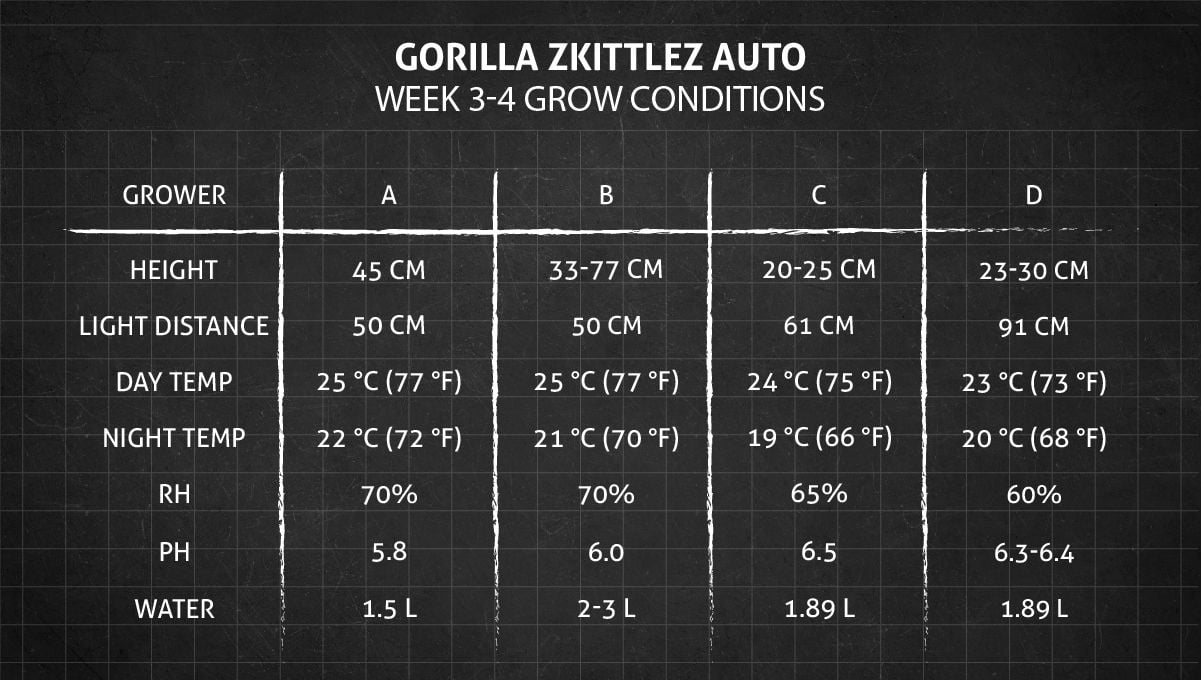
This part of the vegetative stage is also the perfect time to start training your weed, giving the canopy the shape you want. The goal here is to make the plants as compact as possible so that they don't spend extra energy on transporting water and nutrients to the growing points. The other, more important goal is to keep the tops at the same distance from light so that there's no contrast between huge colas above and fluffy little 'popcorns' below.

As you can see in the pictures, Grower C chose the most basic tie-down method (which is actually all one needs to get amazing results at harvest). We should add that with Gorilla Zkittlez Auto plants, it’s best to start training sooner than that because by the end of the first month, most of them will enter the budding stage – it was exactly the case with Growers A, B, and D.
As we mentioned earlier. in coco, you need to start feeding your plants right away. The first thing you'll give them is some kind of a Cal-Mag product as calcium and magnesium are essential for coco cultivation. Most growers even pre-treat their medium with a cal-mag supplement BEFORE planting their autoflower seeds and continue to use one throughout the whole cycle.
If you grow your marijuana organically, you'll also need to inoculate the medium with beneficial micro-organisms, such as bacteria and fungi. These little critters will later use the fertilizers that you'll be giving your plants and transform them into a more digestible form. And, of course, you can't do without some proper plant food either.
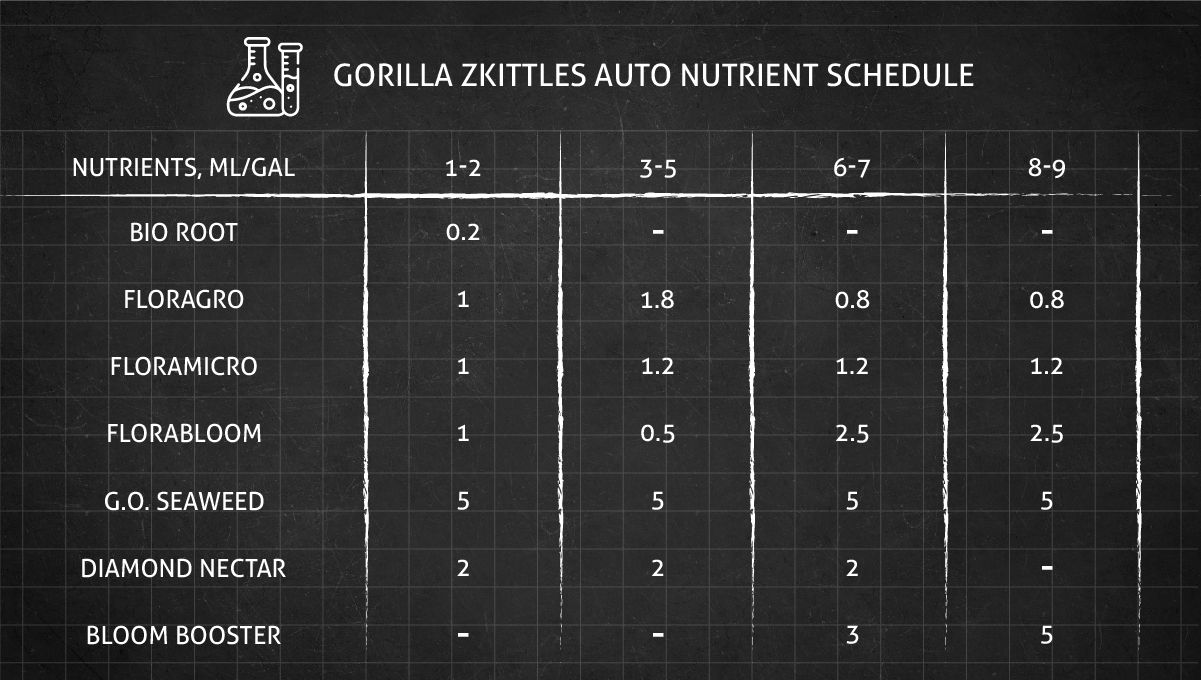
There are dozens of nutrient lines on the market that work great for cannabis, and some have been formulated specifically for coco. Bear in mind that, in the vegetative stage, you'll need an NPK product that's heavier on nitrogen (N) than phosphorus (P) and potassium (K) – those will come in handy during the flowering stage. Moreover, weed needs some essential microelements too, and it needs them from seed to harvest.
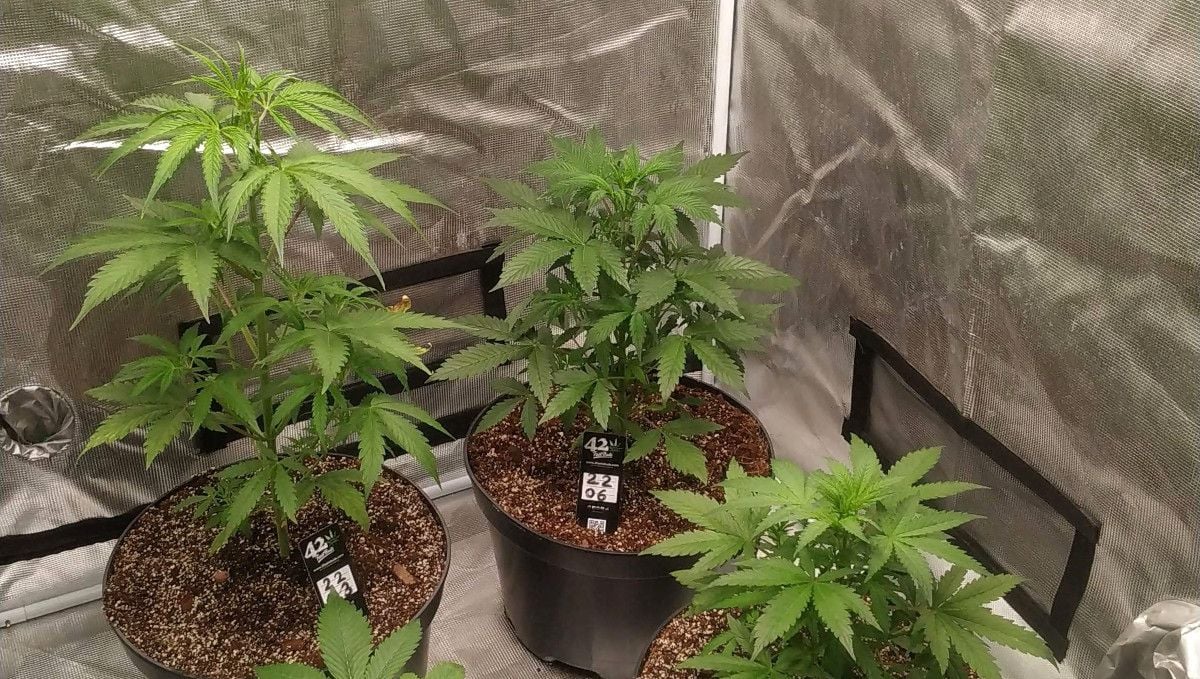
6. Transition (Pre-Flower) | Week 5
When it’s time for your autoflowers to start budding, be prepared to slightly increase the watering volume as the plants are growing and become thirstier by the day. Keep the relative humidity and day and night temps steady or slightly lower them as cannabis prefers cooler and drier conditions in flower.
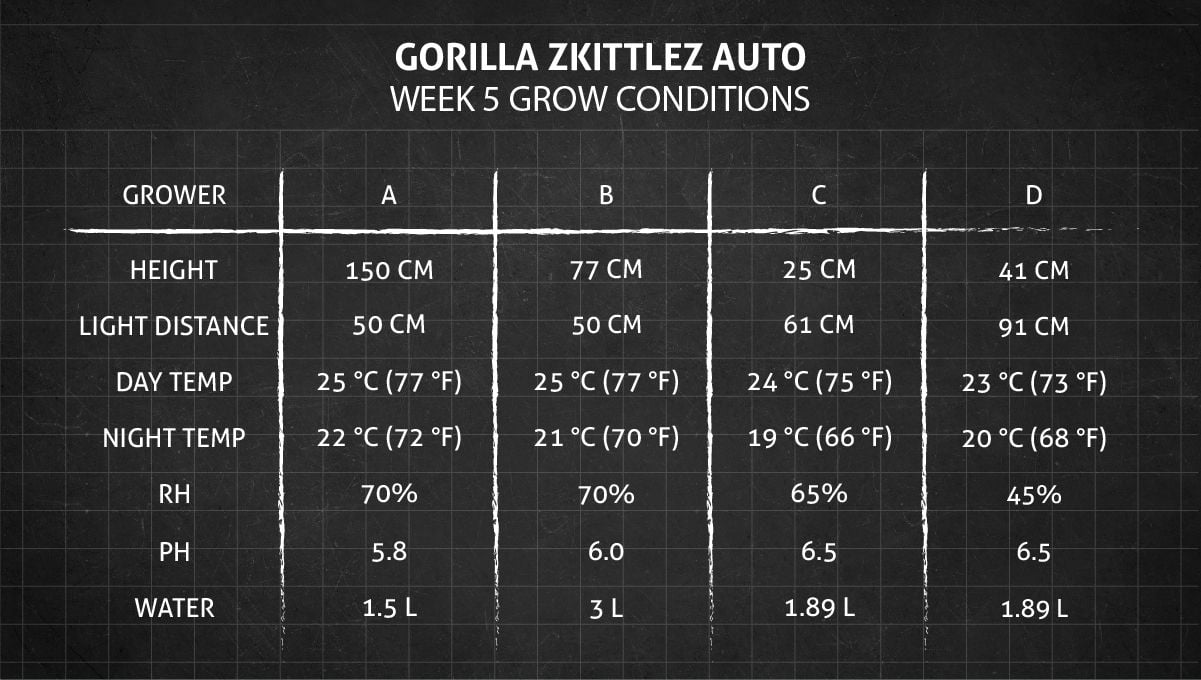
The beauty of autoflowers is that they wrap up their vegetative growth and commence flowering automatically. It means that you won't have to change the light schedule to make them flower. Most growers choose the standard 18/6 schedule from seed to harvest, and it works fine for such strains as Gorilla Zkittlez Auto.
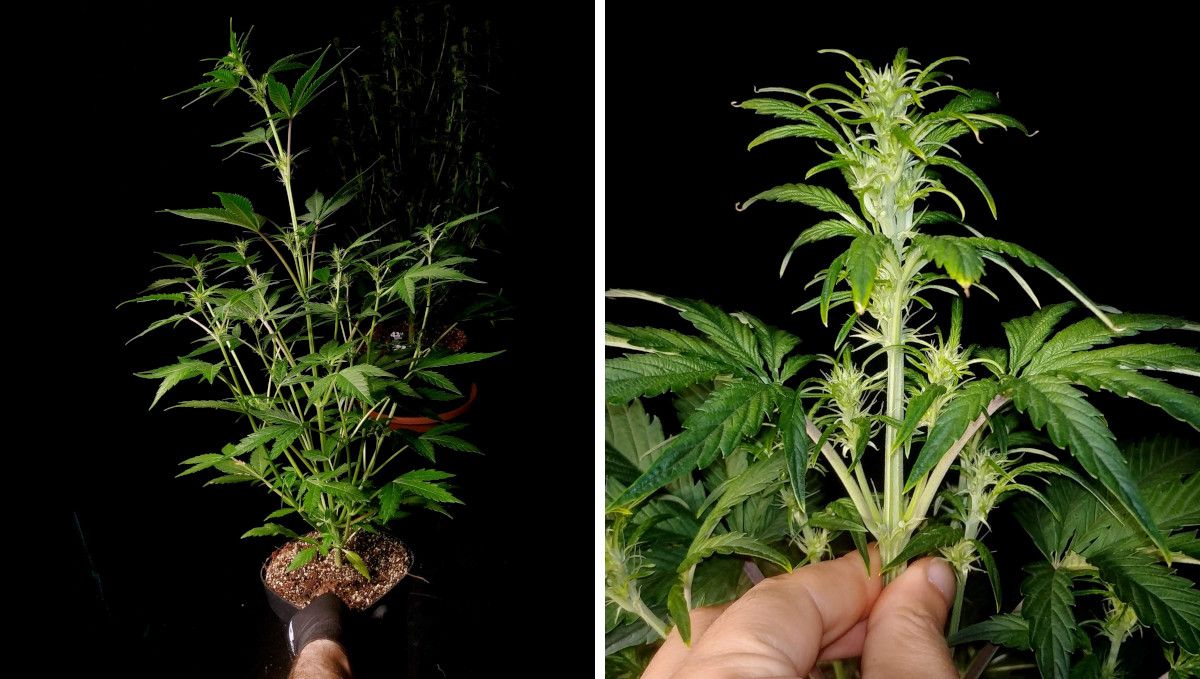
With a super fast strain like this one, you can experiment with 19/5, 20/4, or even 24/0 – rest assured that your plant will start to flower automatically and do it early. Having said that, it’s probably a good idea to give your Gorilla Zkittlez autoflower at least a few hours of sleep every night. This is likely to boost the plant’s health and future yields.
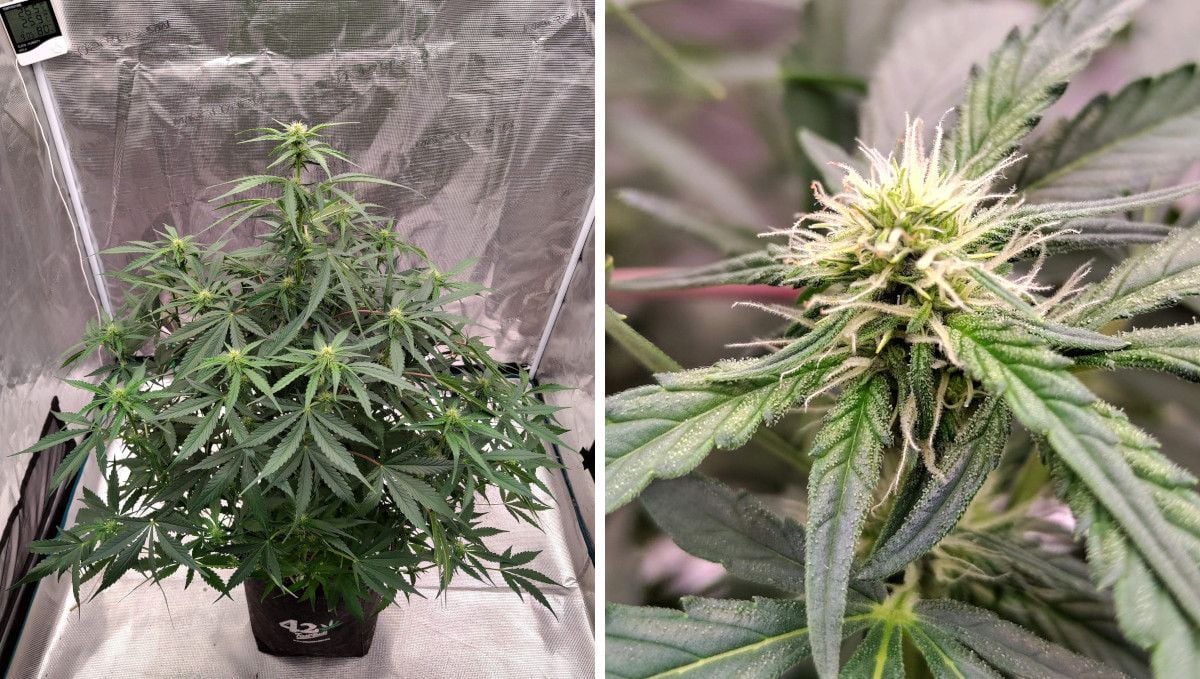
You'll notice your marijuana transitioning to flowering by looking at the nodes – where leaves and side branches are attached to the main stalk. If you look closely enough, you'll see pairs of tiny hairs emerging. A few days later, you'll also notice the tops changing their color – from a uniform green to a lighter shade, sometimes even yellowish.
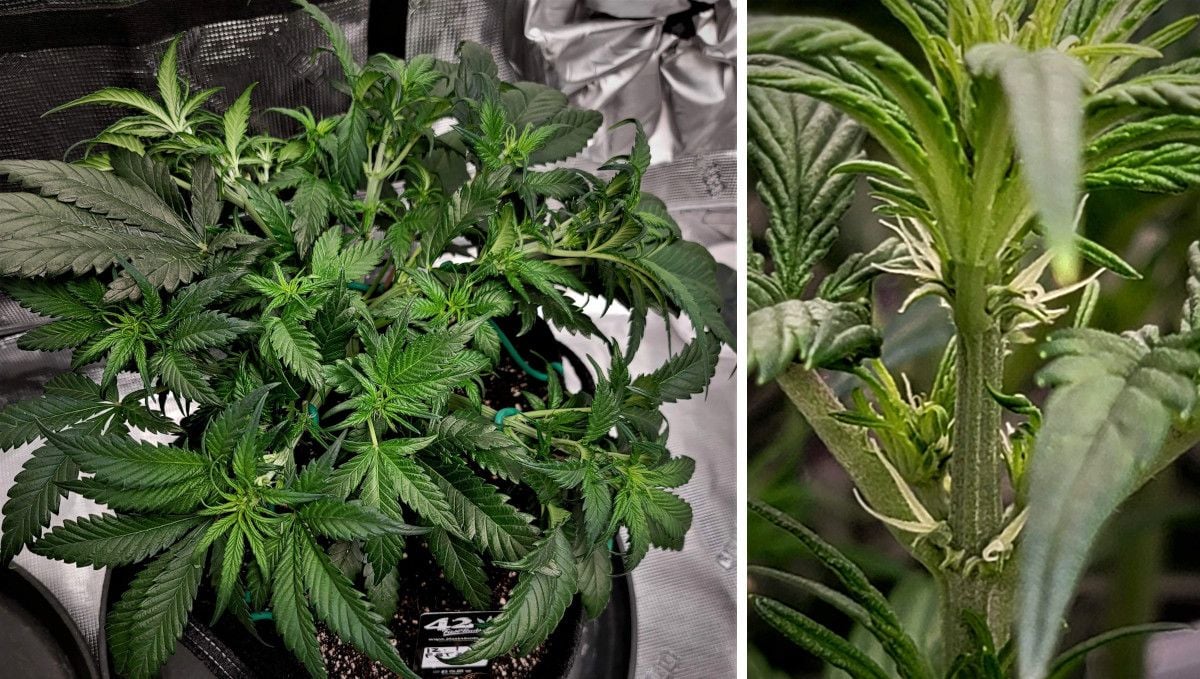
Somewhere at this point in the timeline, you'll want to change your feeding schedule to the one that is more appropriate for the flowering stage, meaning more P and K and less N. Some gardeners do it when they see the first flowers emerge (like in the photo below), others give the plants a week or two to finish stretching first. We recommend the first option, but see what works best for you.
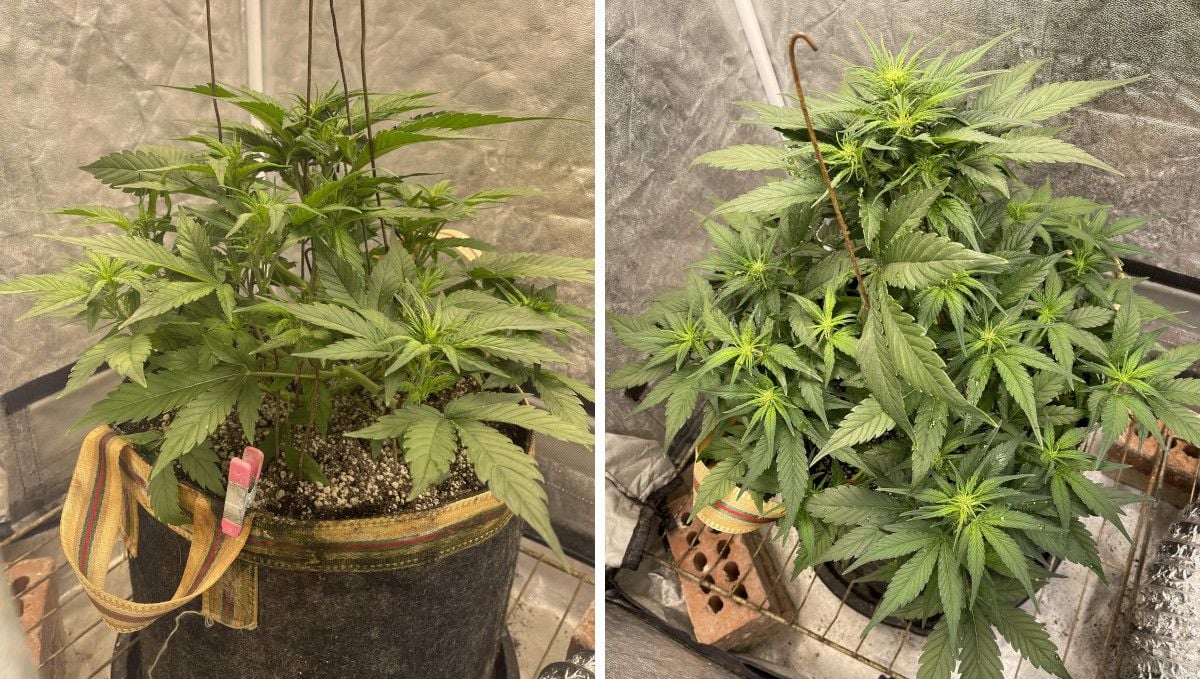
7. Early Flower | Weeks 6-7
The most noticeable change in the early flower is probably not even the growth of future buds at every top and lower node but the elongation of the main stem and the side branches. This is called the flowering stretch, and it's something that catches many first-time growers completely by surprise.
You can let your ladies stretch into the light (as they're now mature enough to handle extra light), or you can keep raising the lights to keep it at a safer distance. Look at what the manufacturer of your LED says about its optimal range.
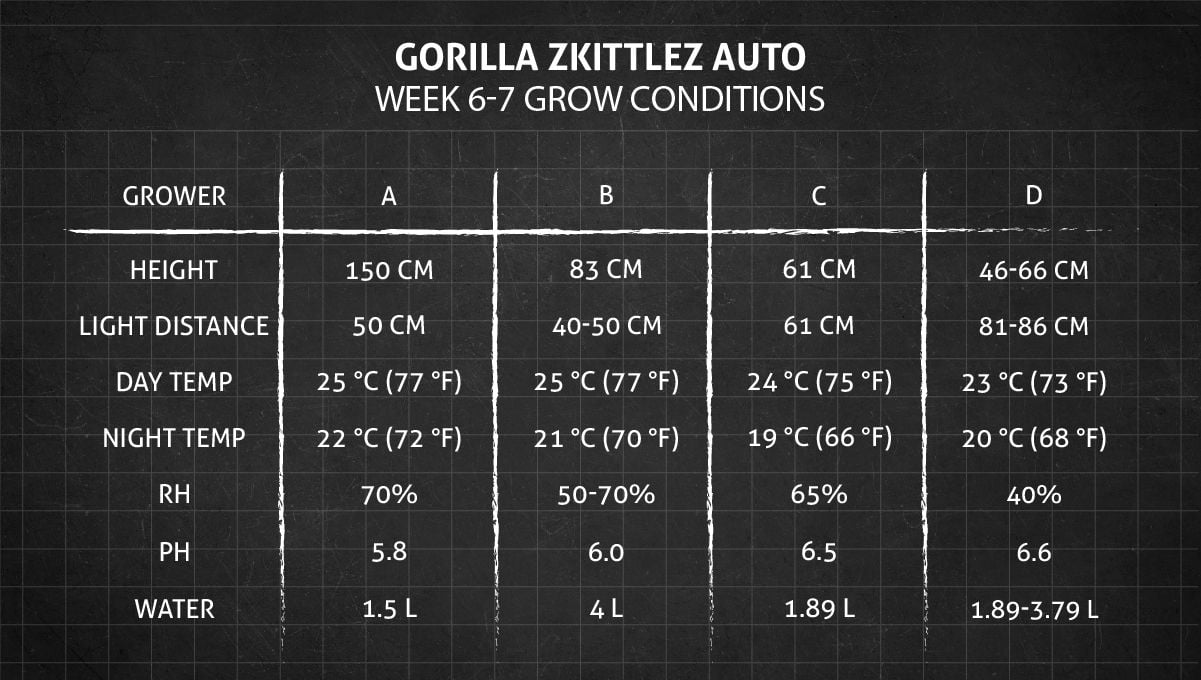
In photoperiod genetics, stretching can lead to serious problems as beginners tend to let them grow too big and leave no vertical space left for the flowering period. With autoflowers, it’s seldom an issue. At least, Gorilla Zkittlez Auto proved a compact enough plant in the four grows that we’ve been following.
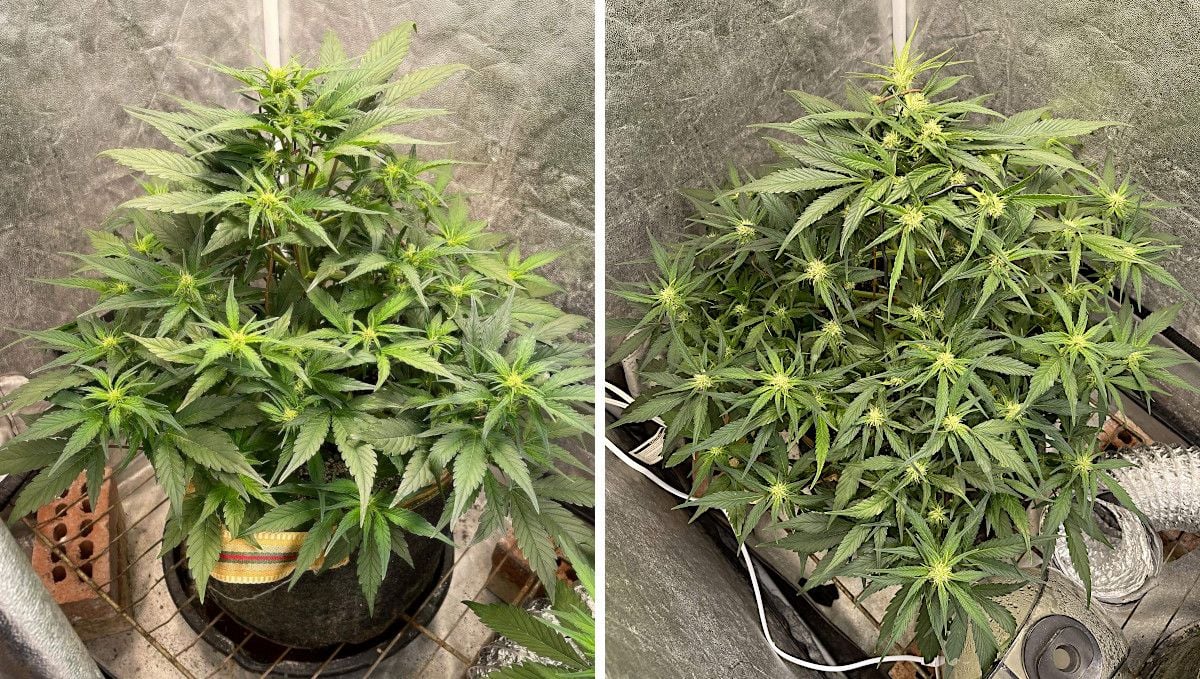
The pic above shows a plant whose branches have only been tied down, and in the one below, the plant hasn’t been trained at all and is still as low-profile as you’d wish indoors.
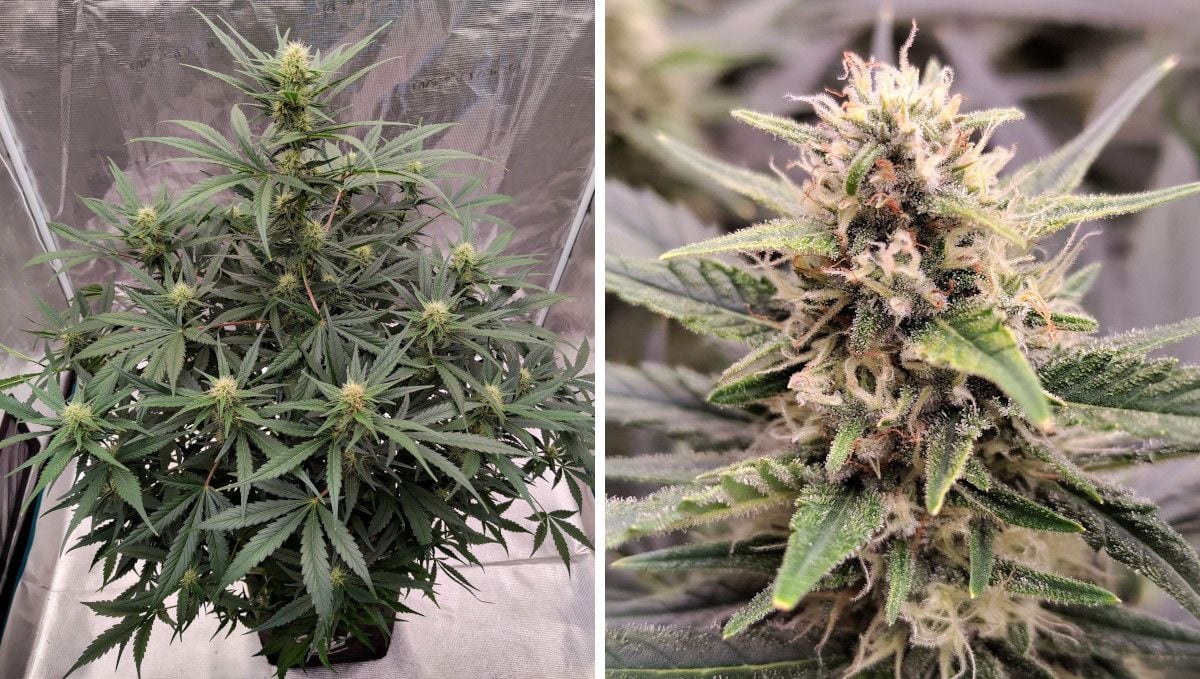
Of course, in a more crowded SOG setup where plants feel the need to compete with each other for light, an untrained Gorilla Zkittlez can get taller but still not as tall as many other autoflowers. This variety seems more interested in stacking up the buds than vertical growth.
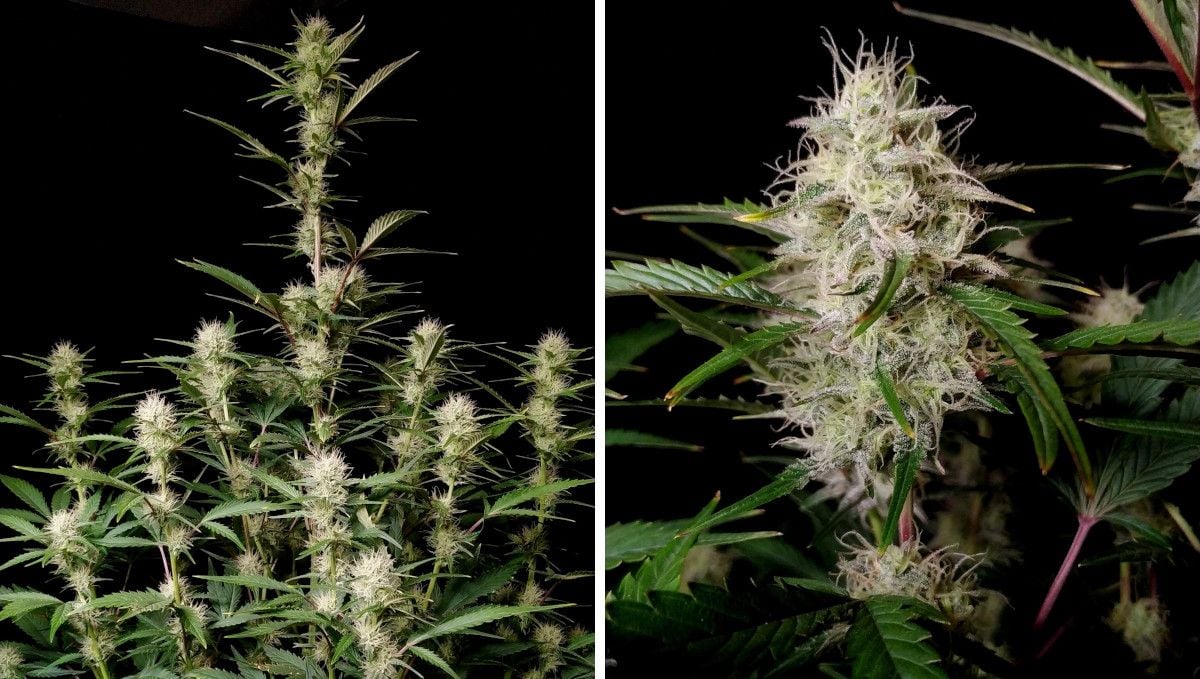
Since buds are forming full-steam now, many growers introduce various products called bloom boosters. They are supposed to speed up the process, make flowers fatter, and facilitate greater production of psychoactive and aromatic substances. You can experiment with these products if you like but keep in mind that they aren't strictly necessary and that their use shouldn't raise the overall concentration of the nutrient solution or you risk seeing the symptoms of nute burn.
Especially, don’t lay on the nitrogen (N). At this point in the timeline, nitrogen isn’t that important and can even interfere with bud development. You can clearly see that you’re overfeeding your weed with N if the leaves have a too deep shade of green and even claw like talons of a bird of prey (see the photo below).
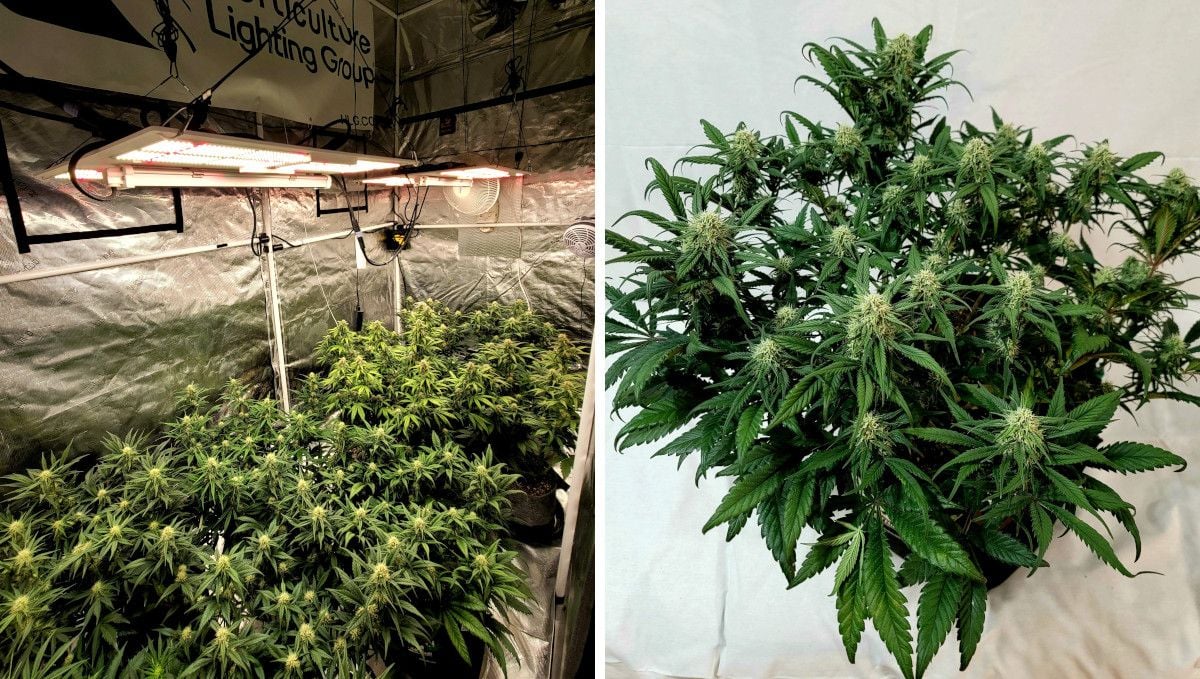
8. Mid Flower (Bulk Phase) | Weeks 8-9
In late flower, the temps shouldn't be too high (this will help to slow down the evaporation of terpenes and the degradation of THC and other cannabinoids). You can also start to decrease the relative humidity – when the colas grow big and dense, there's more risk of mold and other fungal infections, such as bud rot and powdery mildew.
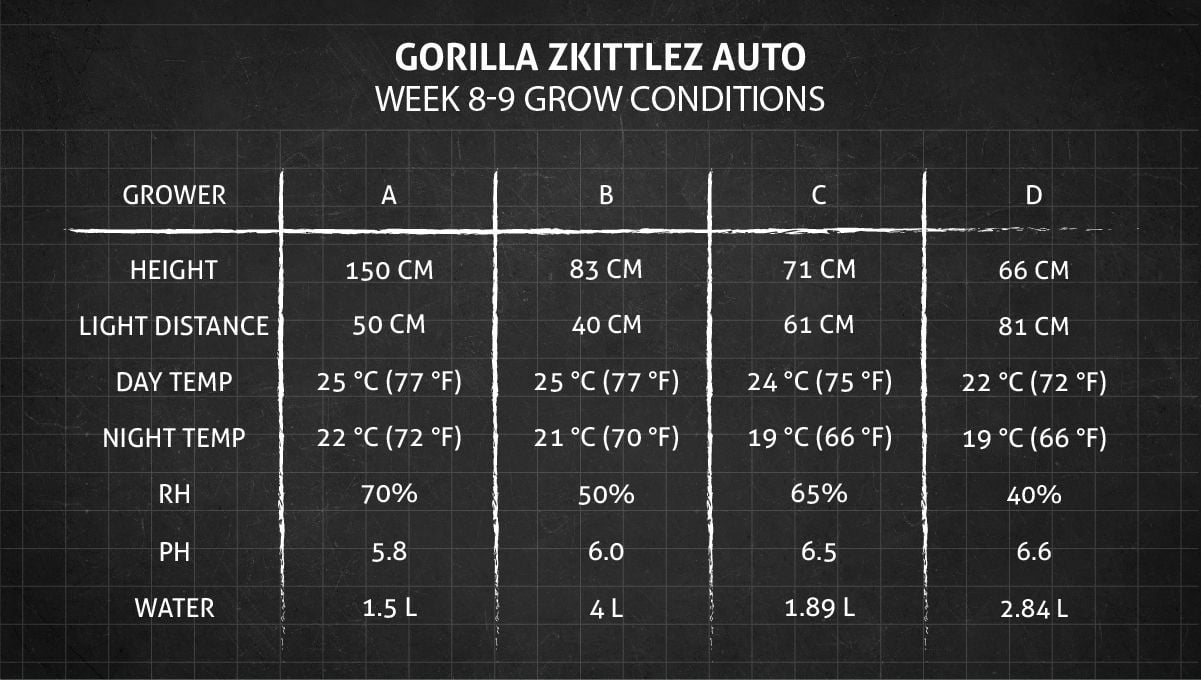
This is probably the most rewarding and calm time in the life cycle of an autoflower. By this time, even the most inexperienced gardeners establish a working relationship with their plants, learn to control the environment, and understand their ladies' needs. They, on their part, stop stretching and channel all their energy into stacking up their flowers and filling them out.
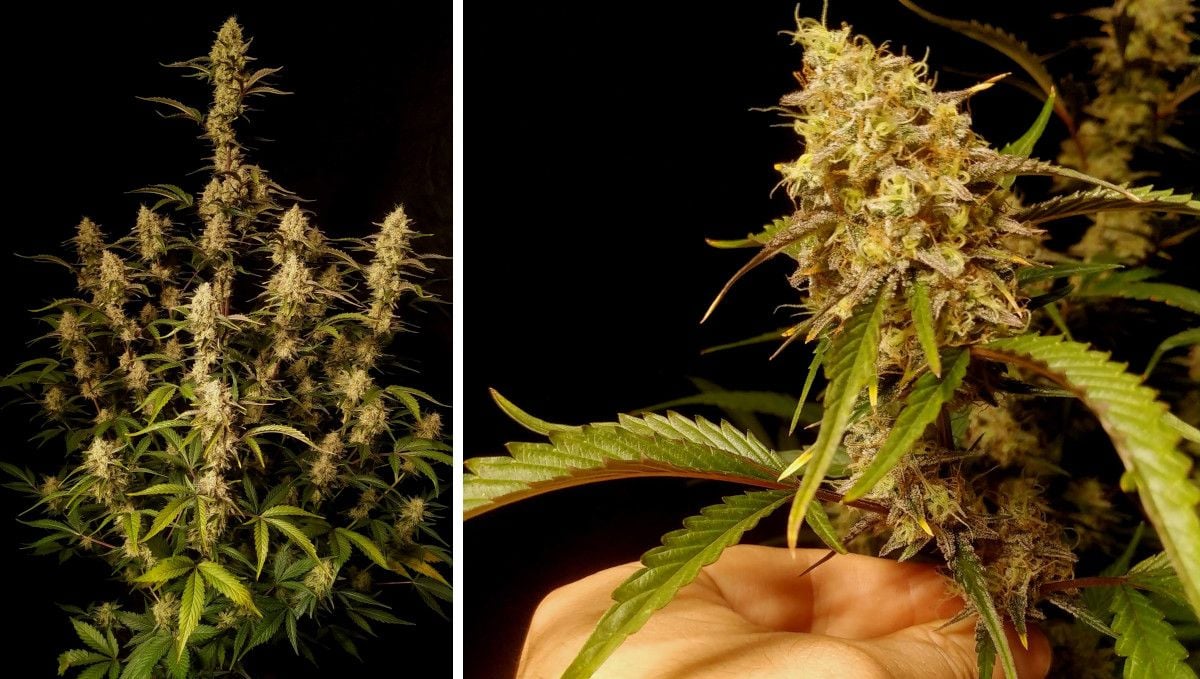
Besides gaining weight, the colas will also get covered in trichomes now. It's these trichomes, or trichs, that store in them the bulk of THC and terpenes. As you can see in the pics below, Gorilla Zkitlez is a quite frosty strain which augurs huge potency and a rich terpene profile. The flip side is that all those terpenes start to really stink up your place so you'll need your carbon filter installed and running, even for a single plant.
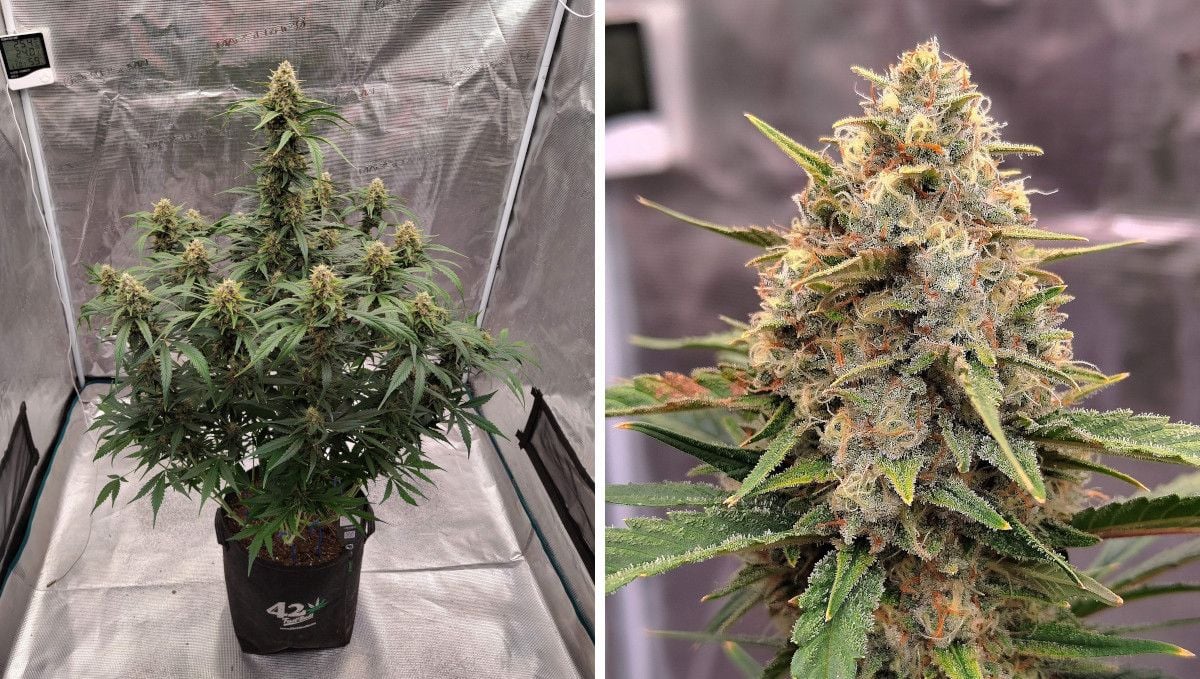
The frost will cover not only calyces but the little leaves as well. (We call them 'sugar leaves'.) At the same time, some of the pistils that were greenish-white before will start to wither and turn amber. It's the first sign that your grow cycle is nearing its end and the buds are starting to mature.
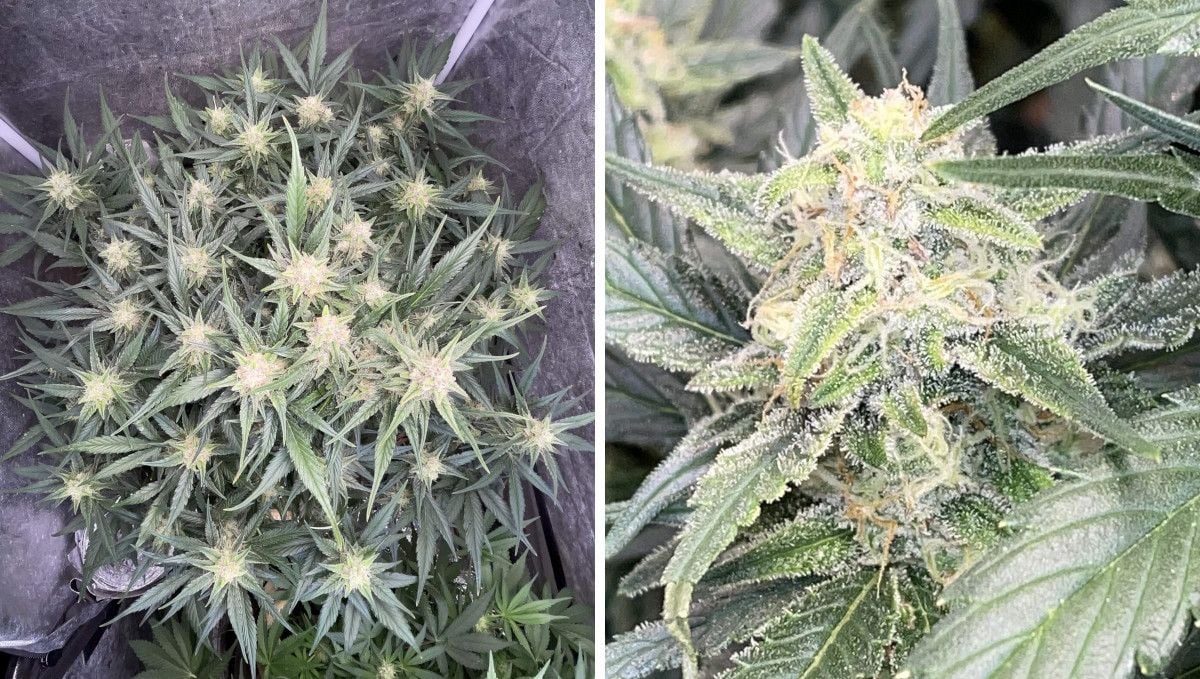
As you have probably guessed by now, Gorilla Zkittlez Auto isn’t likely to cause you trouble with excessive height, and by the start of the bulk phase, their vertical growth will stop completely. Look in the table below at how much the height of Gorilla Zkittlez Auto was changing over the entire life cycle.
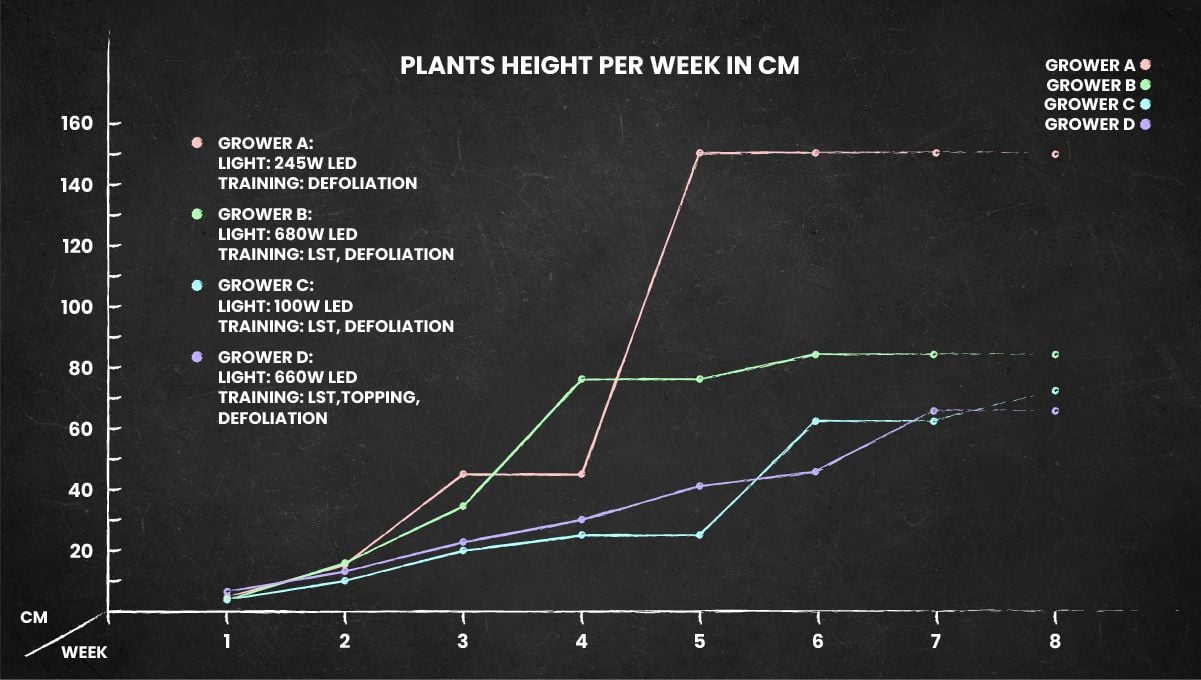
While the plant doesn’t gain in size anymore, it still needs a lot of food. Frankly, even more than ever before. Besides higher doses of staple nutrients, your Gorilla Zkittlez Auto is likely to profit from some kind of a PK-booster (there're a lot of these products on the market). Giving it a large amount of phosphorus and potassium shortly before the final flush is always a good idea.
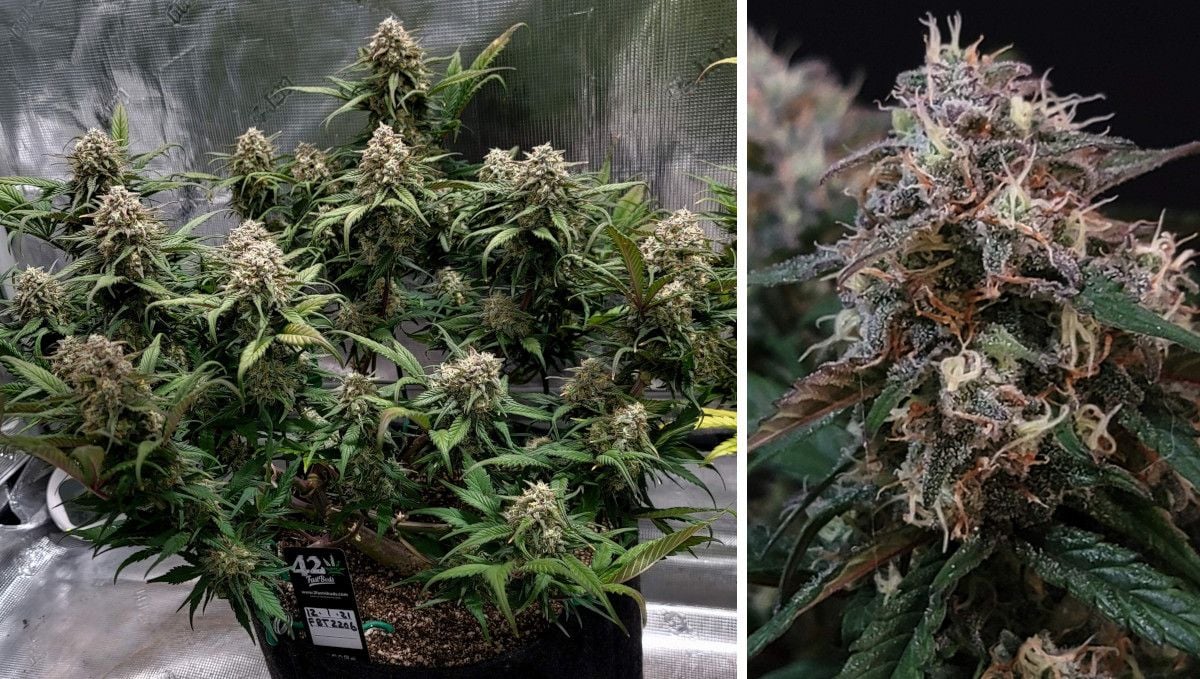
9. Ripening And Harvest | Weeks 10+
In the last weeks leading to the harvest, the less experienced grower may think that since the buds don't grow visually bigger anymore, it's time to harvest them. However, that's a mistake. Besides gaining some serious weight in the last couple of weeks due to an increase in density, the buds also continue to store up THC as well as other cannabinoids and terpenes. At some point, the amount of those reaches a peak, and your job is not to miss the perfect moment for the harvest.
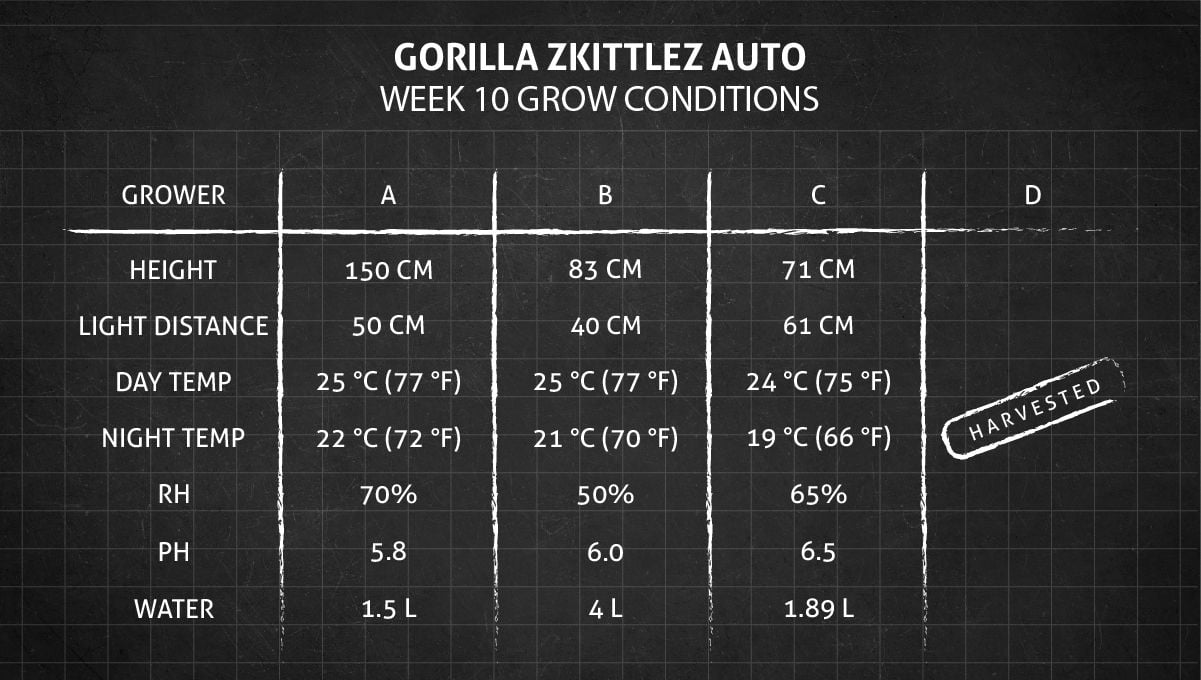
There are several ways to determine whether your buds are ready to be harvested. The least accurate one is to take for granted the characteristics, including the flowering time, given by the seed breeder. Most seed shops now give accurate info, but the figures are only average, and there's always room for genetic variation. Another, a little more accurate method is to look at the pistils: if any of them are still white, it's probably too early; if all of them are withered and brown, the buds are more or less mature. Finally, there's the only reliable method of determining the peak maturity, and it's watching the color of trichomes under a microscope.
Take a 60x jeweler's loupe and inspect the trichomes. If they're clear, the THC levels haven't yet reached a peak. If they're all cloudy/milky, they contain the most amount of THC. If they start to turn amber, the THC in them has begun to degrade into cannabinol (which is more sedating than psychoactive).
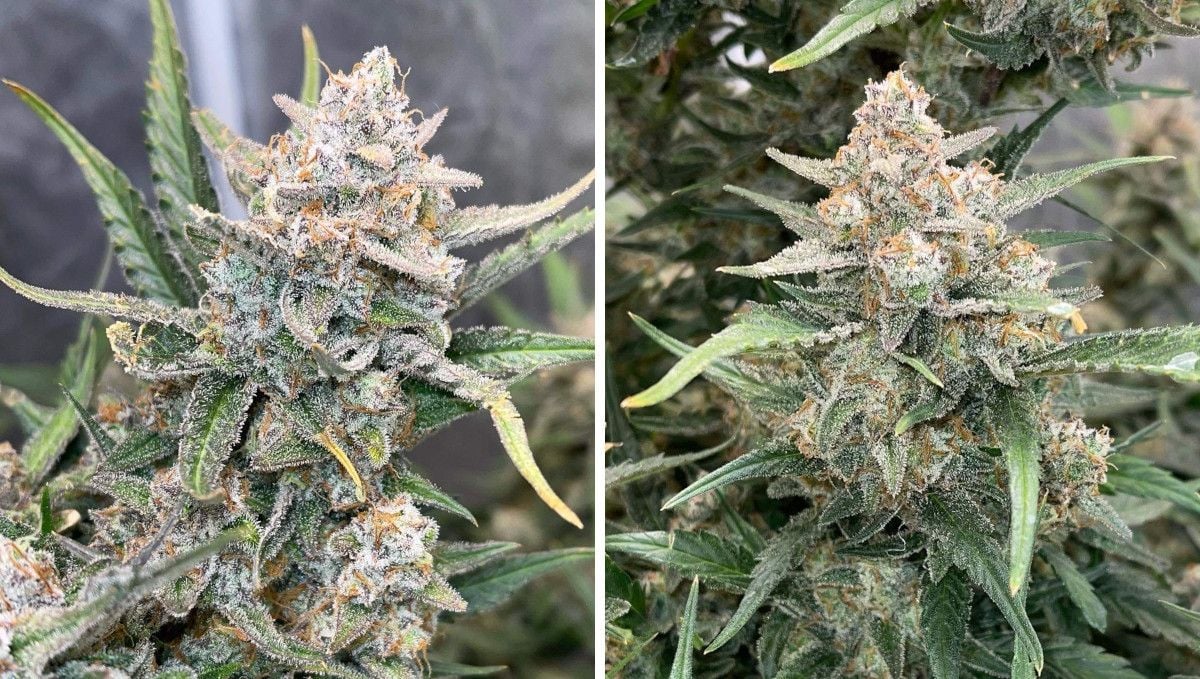
While watching the trichs, don't forget that you'll need to stop feeding your autoflower several days before the harvest and give them only fresh water. It's called the final flush. In hydroponics and coco, one week of flushing is enough, but when you cultivate weed in soil, flush for two weeks. The meaning of this procedure is to wash all built-up nutrients out of the medium and to make the plants starve and use up some of their internal resources, including chlorophyll. Chlorophyll is what gives your buds an unpleasant smell and taste of hay, and a long flush facilitates getting rid of it (which process is later finished by proper drying and curing).
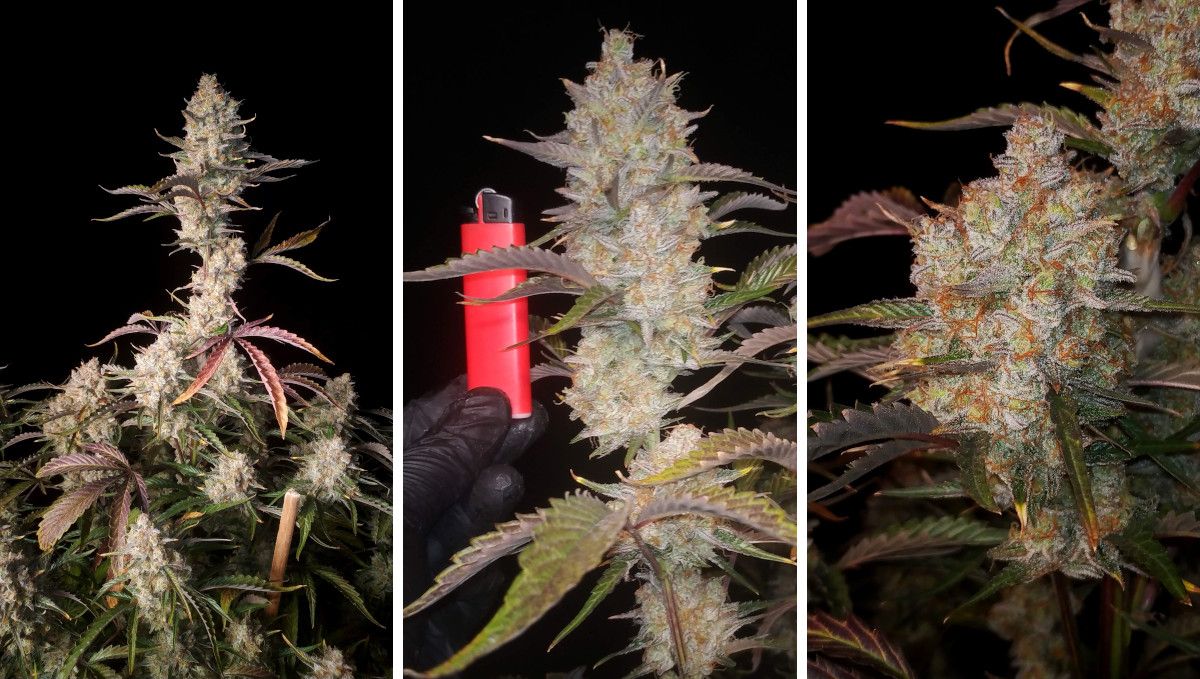
10. The Outcome
As you can see in the graphic below, Gorilla Zkittlez Auto is an incredibly rewarding strain. Granted, the four growers we have chosen for our week-by-week guide have a lot of experience and talent, but still, genetics is the most important condition for success.
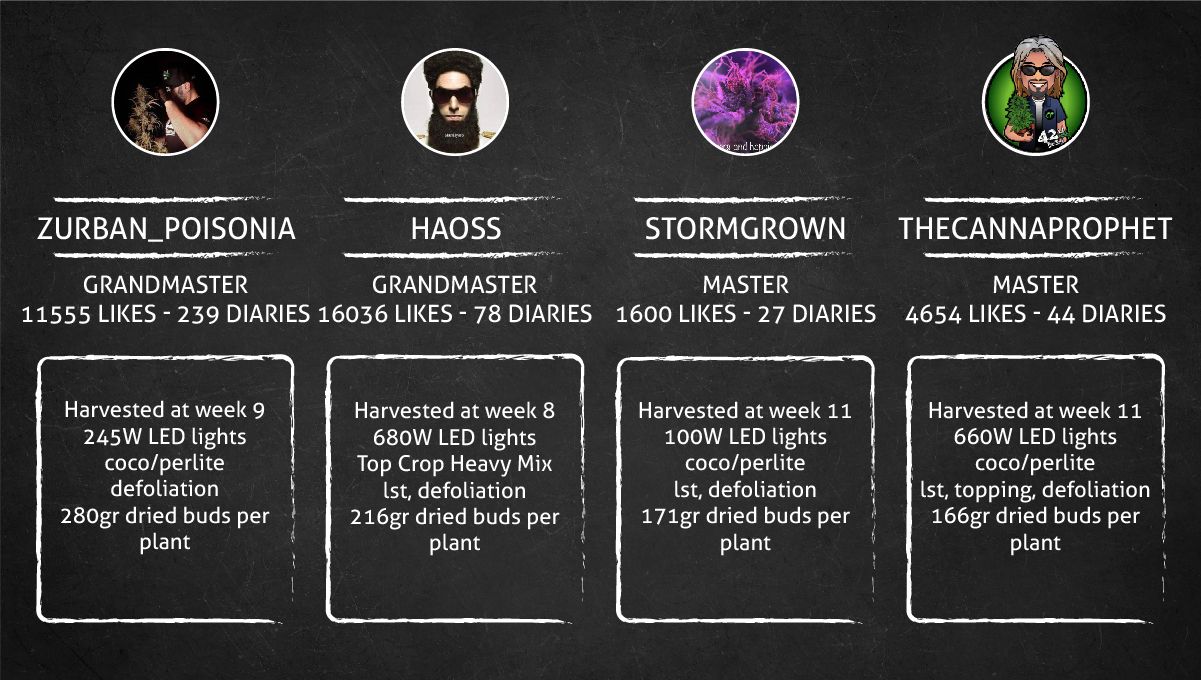
Gorilla Zkittlez Auto Yield
For grower A, Gorilla Zkittlez was the most low-maintenance autoflower out of four in his grow tent. After just 9 weeks of a trouble-free grow cycle, she brought him 280g (9.88 oz) of dry bud.
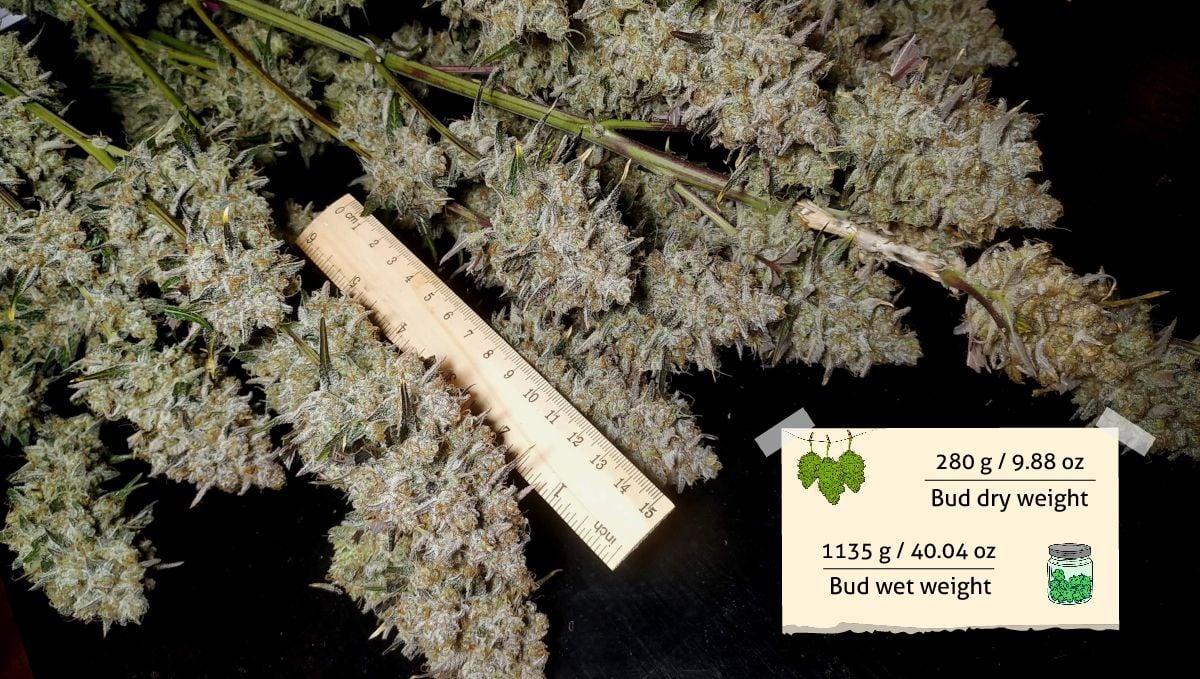
The results of Grower B were very similar to Grower A -- 216g (7.62 oz) of compact and resinous buds.
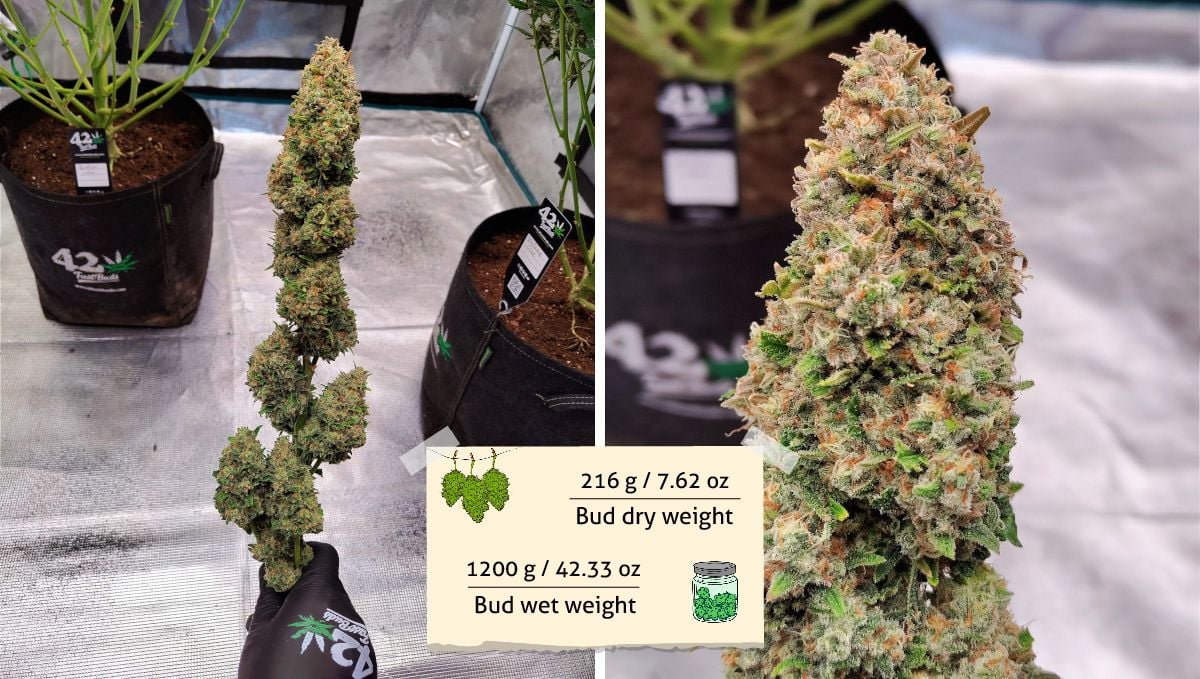
Despite using only a 100W LED, Grower C managed to harvest 171 g (6 ounces) from his single Gorilla Zkittlez Auto. There's a benchmark for indoor growers – one gram of dry bud per every watt used – and this is what every ambitious gardener strives for. In this case, it was 1.71 g/W which is amazing.
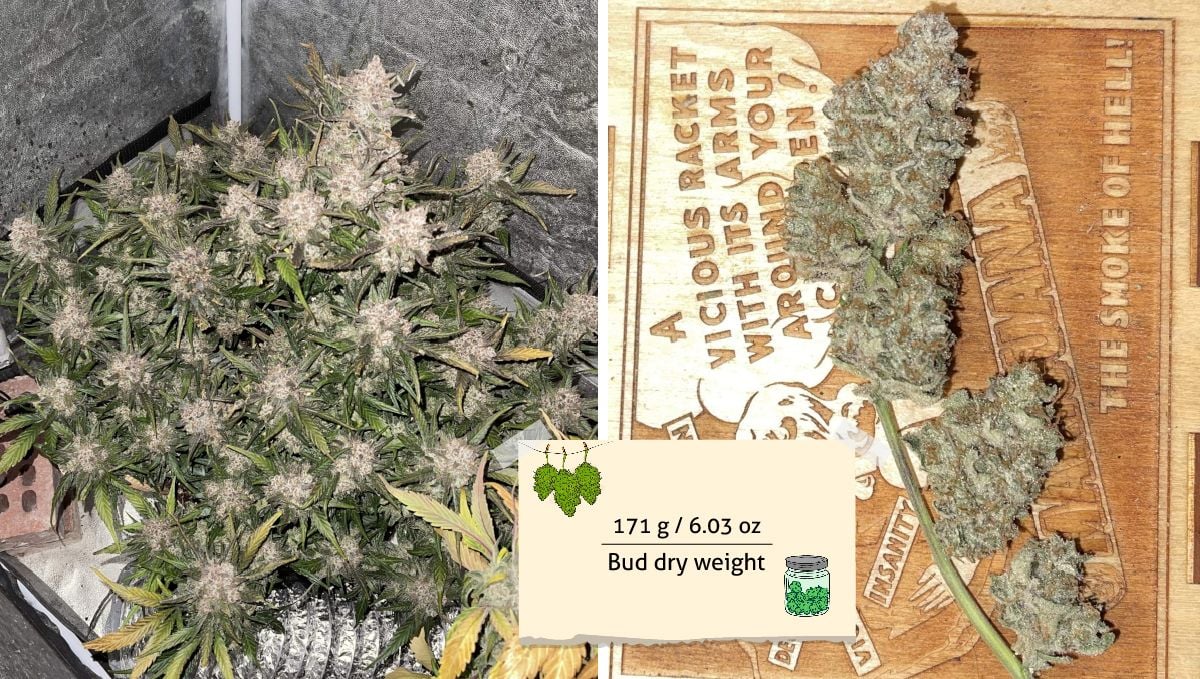
For Grower D, his two Gorilla Zkittlez autoflowers were a small part of a large SOG grow, and he harvested 331 g (11.68 oz) from both of his girls, or 166g/plant.
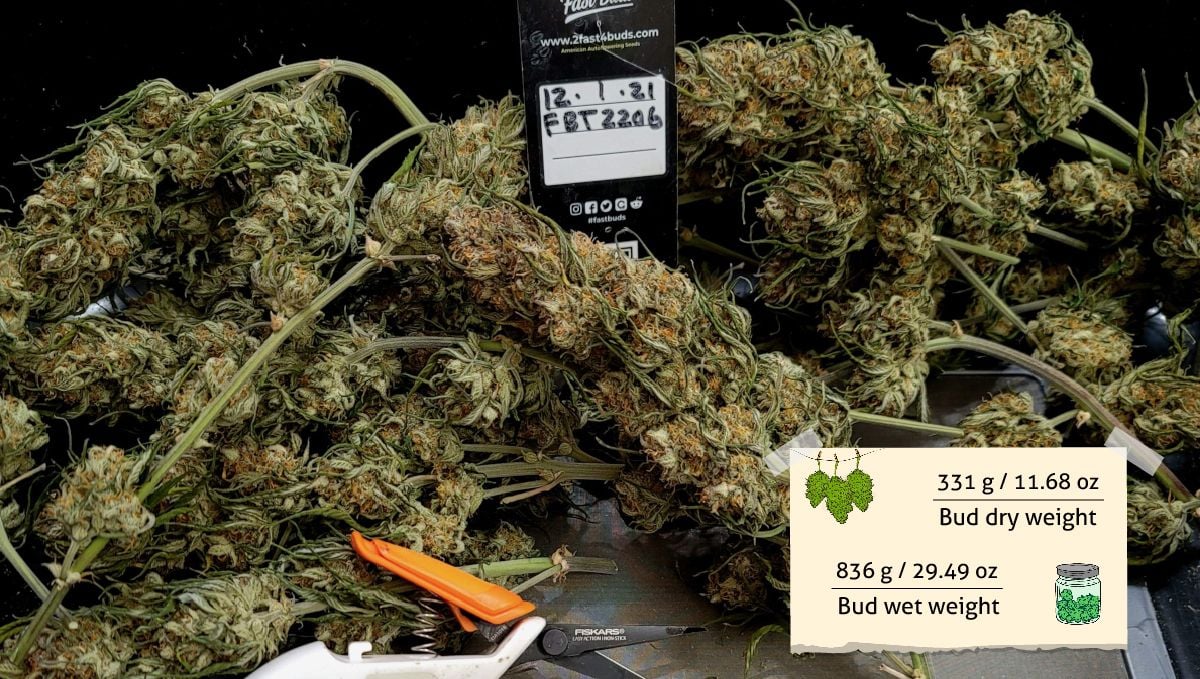
Gorilla Zkittlez Auto Smoke Report
The reviews for Gorilla Zkittlez Auto describe its smoke as having a strong and sweet fruity smell, with some mentioning specific scents like fruit punch, Skittles, and grapefruit. The taste is often described as smooth, sweet, and with a hint of fruitiness.

In terms of effects, it is consistently portrayed as a potent strain that delivers a strong high. It starts with a heady, cerebral effect that stimulates creativity, then transitions into a total body stone. The effects are often described as sedating, making it suitable for evening or nighttime use. They can be quite intense and may lead to a couch-lock. Some users mention experiencing limited mobility and impaired coordination, so caution is advised.
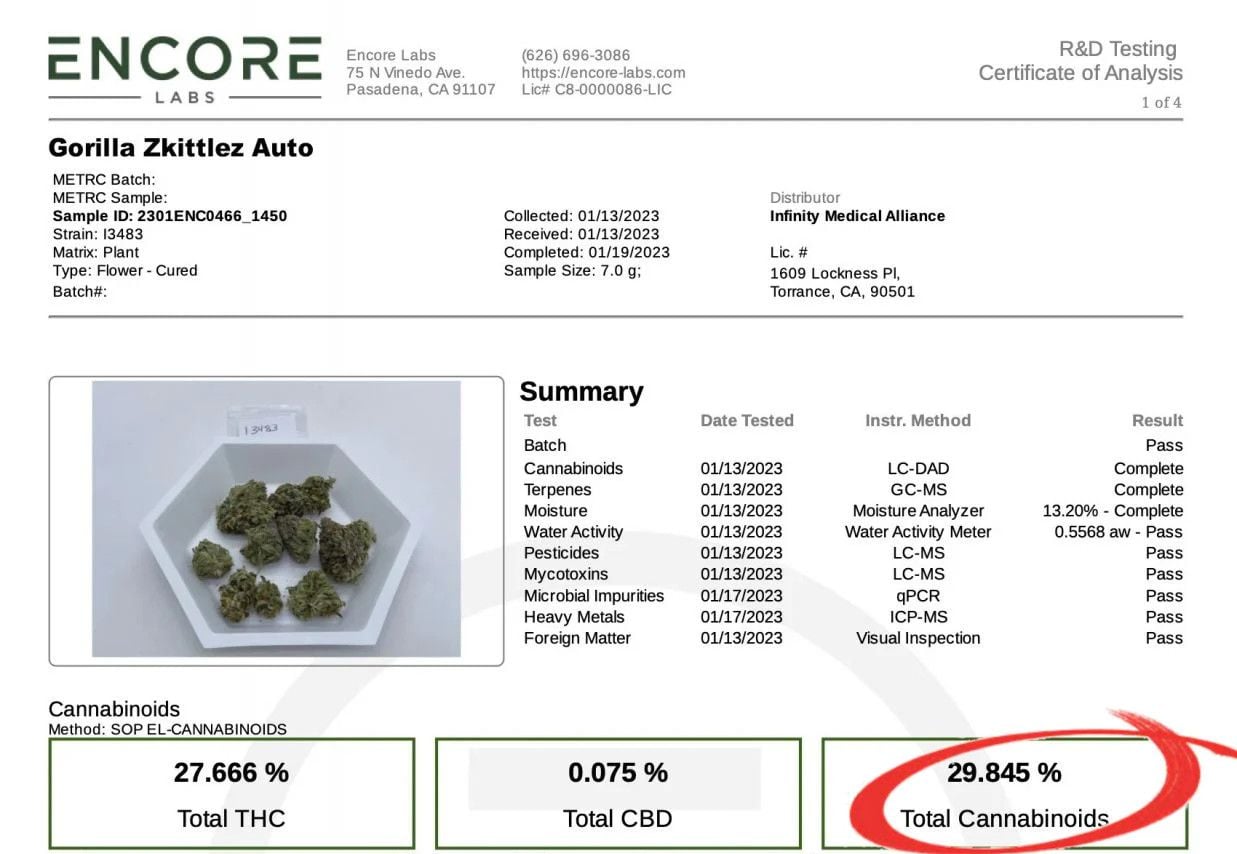
11. In Conclusion
Based on this grow report, Gorilla Zkittlez Auto is a strain that does amazingly indoors. Using coco as a medium and a LED light (even a relatively weak one) results in a plant that, while compact, is insanely high-yielding as it produces a fat and dense cola on each of its many branches. The buds are also completely covered in resin, giving away their Gorilla heritage. At the same time, the flavor profile is nothing like the traditional Gorilla. It's fruity and sweet. It's a great cultivar for harvesting top-shelf product in record-breaking amounts. Happy growing!









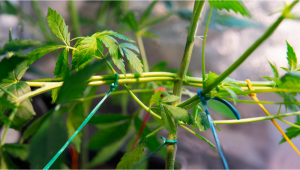
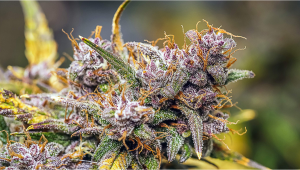
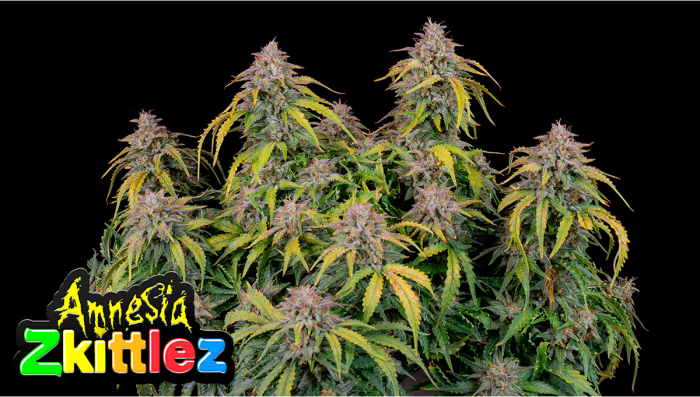

Comments